#port equipment market
Explore tagged Tumblr posts
Text
Rising Global Trade and Containerization of Goods to Benefit Port Equipment Market
According to a Comprehensive Research Study by Market Research Future (MRFR), Port Equipment Market Information by Solutions, Application, Operation, and By Region - Forecast till 2032" The port equipment industry shall go from USD 18.31 Billion in 2023 to USD 21.96 Billion by 2032, with a CAGR of 2.30% from 2023 to 2032.
The type of equipment used in ports that is useful for quickly loading and unloading cargo is known as port equipment. The main use of port equipment in warehouses and port terminals is to handle 20- or 40-foot equivalent units (TEU). During the study, equipment like cranes, forklift trucks, reach stackers, terminal tractors, and others are taken into account. Depending on the purpose, this equipment are typically used to handle cargo containers that are either fully loaded or empty and have a weight of up to 400 tons.
0 notes
Text
Port Equipment Industry worth USD 20.0 Billion by 2027
The Port Equipment Market is poised for significant expansion, with projections indicating a rise from USD 18.2 billion in 2022 to USD 20.0 billion by 2027, reflecting a robust compound annual growth rate (CAGR) of 1.9%. This comprehensive report provides insights into market statistics, size, trends, and industry dynamics, offering a holistic view of the evolving landscape within the port equipment sector.
Remote Sensing Advancements: Remote sensing technologies play a pivotal role in data collection and analysis for both commercial and defense applications within the port equipment domain. Leveraging electromagnetic radiation or acoustical waves, sensors gather data from target objects, enabling precise analysis and informed decision-making.
Download PDF Brochure: https://www.marketsandmarkets.com/pdfdownloadNew.asp?id=184119530
Ship Loaders Segment Growth: Ship loaders, essential for cargo handling and vessel loading operations, emerge as the fastest-growing market segment. Fueled by increasing trade activities and the demand for efficient transportation, loaders equipped with diesel engines witness heightened demand, particularly in small or medium-sized port terminals.
Bulk Handling Application Surge: The bulk handling segment experiences rapid growth, driven by escalating industrialization and the need for efficient material handling. Conveyors, ship loaders, and hoppers play pivotal roles in loading, unloading, and transferring bulk materials such as iron, coal, and Petroleum, Oil & Lubricants (POL), catering to the evolving needs of warehouses and distribution centers.
Asia Pacific Growth Trajectory: The Asia Pacific region emerges as the fastest-growing market for port equipment, propelled by robust infrastructure development and burgeoning cargo activity. Factors such as rising GDP, infrastructure investments, and government initiatives for Foreign Direct Investment (FDI) foster market expansion. Foreign equipment manufacturers are strategically expanding their presence in the region, intensifying competition with regional players and driving innovation and product development initiatives.
Industry Leaders: Key players such as Kalmar, Liebherr Group, Konecranes Abp, Sany Heavy Industry Co., Ltd., and Shanghai Zhenhua Heavy Industries (ZPMC) dominate the global port equipment market. Through expansion endeavors and product innovation initiatives, these players strengthen their foothold in the competitive landscape, driving market growth and competitiveness.
As the Port Equipment Market continues on its growth trajectory, stakeholders must navigate through dynamic market forces, technological advancements, and regional dynamics to capitalize on emerging opportunities.
Inquiry Before Buying: https://www.marketsandmarkets.com/Enquiry_Before_BuyingNew.asp?id=184119530
From leveraging remote sensing technologies to cater to evolving application needs to expanding footholds in high-growth regions like Asia Pacific, industry players have a myriad of avenues for growth and innovation. By aligning strategies with market trends and customer preferences, players can unlock new frontiers of growth and establish sustainable market positions in the global port equipment landscape.
About MarketsandMarkets™
MarketsandMarkets™ has been recognized as one of America's best management consulting firms by Forbes, as per their recent report.
MarketsandMarkets™ is a blue ocean alternative in growth consulting and program management, leveraging a man-machine offering to drive supernormal growth for progressive organizations in the B2B space. We have the widest lens on emerging technologies, making us proficient in co-creating supernormal growth for clients.
Contact: Mr. Aashish Mehra MarketsandMarkets™ INC. 630 Dundee Road, Suite 430, Northbrook, IL 60062 USA: +1-888-600-6441 Email: [email protected]
0 notes
Text
Port Equipment Market Insights: Growth, Legal Hurdles, and Future Forecasts

The port equipment market plays a critical role in the global maritime industry, enabling the efficient movement of goods and ensuring the smooth operation of port activities. From cranes to container handling systems, port equipment is essential for the daily functioning of seaports around the world. As the demand for global trade grows, so does the need for advanced port equipment that can handle higher volumes, increase efficiency, and comply with new regulations. This blog explores the market size, growth, legal constraints, limitations, key companies, segmentation, and future forecast for the port equipment market.
Market Growth & Size
The global port equipment market was valued at USD 18.31 billion in 2023 and is projected to grow to USD 21.96 billion by 2032, exhibiting a CAGR of 2.0% during the forecast period
Key Growth Drivers:
Increased Global Trade: As international trade volumes continue to rise, ports must upgrade their equipment to handle increased traffic. The growth of e-commerce and demand for rapid delivery of goods are also contributing to this trend.
Technological Advancements: Innovations such as automation, electric-powered port equipment, and AI-driven solutions are helping ports improve their operational efficiency, reducing labor costs, and minimizing environmental impact.
Sustainability Initiatives: The focus on greener port operations, driven by regulatory pressures, is pushing ports to adopt energy-efficient equipment. Many governments are investing in infrastructure that reduces carbon emissions, which supports the adoption of electric and hybrid port equipment.
Legal Constraints in the Port Equipment Market
The port equipment market is governed by a variety of legal constraints aimed at ensuring safety, environmental protection, and operational efficiency.
Key Legal Constraints:
Emission Standards: Stringent emission regulations, particularly in Europe and North America, require ports to reduce their carbon footprint. This has led to an increased focus on electric and hybrid equipment that produces fewer emissions compared to traditional diesel-powered machines
Safety Regulations: Port equipment must meet strict safety standards to prevent accidents and ensure the safety of workers. Regulatory bodies like the Occupational Safety and Health Administration (OSHA) and the International Maritime Organization (IMO) play a crucial role in overseeing the safety compliance of port equipment.
Operational Compliance: Ports in different countries must comply with local and international trade regulations, which can impact equipment purchasing decisions and operational protocols.
Limitations of the Port Equipment Market
Despite growth, the port equipment market faces several limitations that could impact its expansion.
Key Limitations:
High Capital Costs: The cost of purchasing and maintaining advanced port equipment is a significant barrier for smaller ports, limiting their ability to compete with larger, more financially equipped facilities. Automation and electric equipment require substantial initial investment.
Regulatory Uncertainties: Geopolitical and trade disputes can create uncertainties in regulatory frameworks, affecting the demand for port equipment. Changes in trade policies can alter shipping routes, thereby impacting the need for certain types of port equipment
Technological Disruptions: While advancements in technology can drive efficiency, the rapid pace of innovation also means that equipment can become obsolete more quickly, leading to increased replacement costs for port operators.
Key Companies in the Port Equipment Market
Several key players dominate the global port equipment market, offering a wide range of solutions to meet the evolving needs of ports worldwide.
Major Companies:
Konecranes: A global leader in material handling solutions, Konecranes provides cranes and lifting equipment to ports across the world. Their products are known for their durability and efficiency, with a focus on automation.
Kalmar (Cargotec Corporation): Specializing in container handling equipment, Kalmar is a major player in the port equipment market. They offer a range of equipment, from terminal tractors to automated guided vehicles (AGVs).
Liebherr Group: Known for its high-performance cranes, Liebherr supplies mobile harbor cranes, ship-to-shore cranes, and other heavy equipment that enhance the operational capabilities of ports.
Hyster-Yale Materials Handling: A key player in providing port equipment such as lift trucks and reach stackers, Hyster-Yale focuses on developing energy-efficient equipment, particularly for container handling.
Shanghai Zhenhua Heavy Industries (ZPMC): ZPMC is one of the largest manufacturers of port machinery in the world, producing ship-to-shore cranes and other heavy-duty equipment for container handling.
Market Segmentation by Product and by Application
The port equipment market can be segmented based on product type and application.
By Product Type:
Cranes: Including mobile harbor cranes, ship-to-shore cranes, and gantry cranes, this segment represents a significant portion of the port equipment market. Cranes are essential for container handling and bulk cargo operations.
Container Handling Equipment: This includes straddle carriers, terminal tractors, and reach stackers. As container traffic continues to grow, so does the demand for specialized equipment that can efficiently manage container movements.
Forklifts and Stackers: These machines are used for moving and stacking goods within port terminals and warehouses, making them essential for cargo storage and retrieval operations.
By Application:
Container Handling: The largest segment by application, driven by the increasing volume of containerized goods being shipped globally.
Bulk Handling: Equipment used for handling loose cargo such as grains, coal, and minerals falls into this segment.
General Cargo: Ports that handle a mix of containerized and non-containerized goods require versatile equipment capable of handling various types of cargo.
Future Forecast for the Port Equipment Market
Looking ahead, the port equipment market is expected to continue its growth, driven by a combination of technological advancements, global trade demand, and regulatory pressures.
Key Future Trends:
Automation: The trend toward automation is expected to accelerate, with more ports adopting automated systems to improve efficiency and reduce labor costs. Automated stacking cranes and AGVs are likely to become more prevalent in the coming years.
Sustainability: As environmental regulations become stricter, ports will increasingly invest in green technologies. The adoption of electric and hybrid port equipment will continue to grow as part of global efforts to reduce emissions.
Expansion of Emerging Markets: Ports in Asia-Pacific and Africa are expected to see significant investments in infrastructure, which will drive the demand for advanced port equipment in these regions.
Forecast Growth:
The port equipment market is projected to grow at a CAGR of 2.0% through 2032, with increasing investments in port infrastructure and rising trade volumes fueling the market's expansion
Conclusion
The port equipment market is set for steady growth over the next decade, driven by rising global trade, technological advancements, and sustainability initiatives. While challenges such as high capital costs and regulatory uncertainties remain, key players like Konecranes, Kalmar, and Liebherr are leading the way in providing innovative solutions to meet the evolving needs of the industry. As automation and green technologies continue to shape the future of port operations, the port equipment market is well-positioned for sustained growth.
Contact Us for more information on the Port Equipment Market Research 2023–2030 Forecast : Or Phone Call us :
USA — +1 507 500 7209 | India — +91 750 648 0373
Browse More Article
Powder Metallurgy Market Size
Power Electronics Market Trends
Precision Medicine Market Overview
Refrigerants Market Growth
0 notes
Text
Despite Sparta’s reputation for superior fighting, Spartan armies were as likely to lose battles as to win them, especially against peer opponents such as other Greek city-states. Sparta defeated Athens in the Peloponnesian War—but only by accepting Persian money to do it, reopening the door to Persian influence in the Aegean, which Greek victories at Plataea and Salamis nearly a century early had closed. Famous Spartan victories at Plataea and Mantinea were matched by consequential defeats at Pylos, Arginusae, and ultimately Leuctra. That last defeat at Leuctra, delivered by Thebes a mere 33 years after Sparta’s triumph over Athens, broke the back of Spartan power permanently, reducing Sparta to the status of a second-class power from which it never recovered. Sparta was one of the largest Greek city-states in the classical period, yet it struggled to achieve meaningful political objectives; the result of Spartan arms abroad was mostly failure. Sparta was particularly poor at logistics; while Athens could maintain armies across the Eastern Mediterranean, Sparta repeatedly struggled to keep an army in the field even within Greece. Indeed, Sparta spent the entirety of the initial phase of the Peloponnesian War, the Archidamian War (431-421 B.C.), failing to solve the basic logistical problem of operating long term in Attica, less than 150 miles overland from Sparta and just a few days on foot from the nearest friendly major port and market, Corinth. The Spartans were at best tactically and strategically uncreative. Tactically, Sparta employed the phalanx, a close-order shield and spear formation. But while elements of the hoplite phalanx are often presented in popular culture as uniquely Spartan, the formation and its equipment were common among the Greeks from at least the early fifth century, if not earlier. And beyond the phalanx, the Spartans were not innovators, slow to experiment with new tactics, combined arms, and naval operations. Instead, Spartan leaders consistently tried to solve their military problems with pitched hoplite battles. Spartan efforts to compel friendship by hoplite battle were particularly unsuccessful, as with the failed Spartan efforts to compel Corinth to rejoin the Spartan-led Peloponnesian League by force during the Corinthian War. Sparta’s military mediocrity seems inexplicable given the city-state’s popular reputation as a highly militarized society, but modern scholarship has shown that this, too, is mostly a mirage. The agoge, Sparta’s rearing system for citizen boys, frequently represented in popular culture as akin to an intense military bootcamp, in fact included no arms training or military drills and was primarily designed to instill obedience and conformity rather than skill at arms or tactics. In order to instill that obedience, the older boys were encouraged to police the younger boys with violence, with the result that even in adulthood Spartan citizens were liable to settle disputes with their fists, a tendency that predictably made them poor diplomats. But while Sparta’s military performance was merely mediocre, no better or worse than its Greek neighbors, Spartan politics makes it an exceptionally bad example for citizens or soldiers in a modern free society. Modern scholars continue to debate the degree to which ancient Sparta exercised a unique tyranny of the state over the lives of individual Spartan citizens. However, the Spartan citizenry represented only a tiny minority of people in Sparta, likely never more than 15 percent, including women of citizen status (who could not vote or hold office). Instead, the vast majority of people in Sparta, between 65 and 85 percent, were enslaved helots. (The remainder of the population was confined to Sparta’s bewildering array of noncitizen underclasses.) The figure is staggering, far higher than any other ancient Mediterranean state or, for instance, the antebellum American South, rightly termed a slave society with a third of its people enslaved.
5K notes
·
View notes
Text
Describing Scene Locations
Anonymous asked: I've been writing for a decade, mostly short stories, and have recently started writing a fantasy set in the 17th century. My setting is a world pretty much like ours, but with made-up names for specific towns and whatnot. The characters are pirates, and a few are non-human. I'm finding it difficult to figure out where certain plot points take place when the story is mostly character-driven. There are parts where they need to be on land, but apart from 'vague port/island', I don't know what else to do with it. (Am I overthinking this?) I suppose my question is: How specific do secondary locations have to be for it to be immersive and realistic (for their world) without it being lackluster or overdone? I don't want it all be "it's a beach with a village," but adding a giant seaside kingdom seems overkill if it's only mentioned in passing once or twice. Thank you so much for taking the time to answer these - this whole blog is a gift, really.
[Ask edited for length]
First, thank you... that is very kind of you to say! ♥
So, I think it really helps to think of your story in terms of scenes, and to think of each scene almost like a scene in a play. Your scene's setting is like the stage in the play, and the amount of description is the amount of scenery and props on the stage.
If you've been to plays, you've probably noticed that the scenery can be very minimal or very elaborate, depending on the needs of the show:
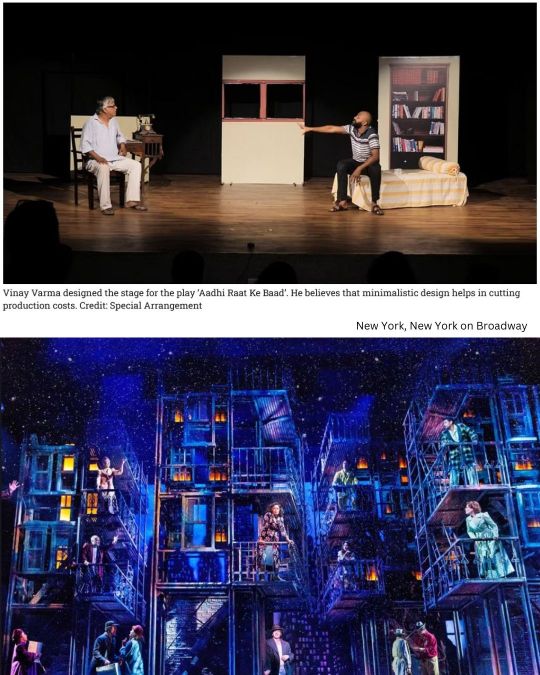
With fiction, it works the same way. How little or how much you describe the scenery (setting) depends on the needs of the scene, but you do need to make sure to give the reader a sense of place. Looking at the first image, just with the little bit of scenery that's there, we know this scene is taking place in a home, perhaps a living room. If the two men were just sitting on chairs with no other scenery, we wouldn't have that sense of place.
However, that doesn't mean that any of your scenes need to be set in sprawling seaside kingdoms. There are all sorts of land-based settings for pirates:
-- bustling port town like Port Royal or Tortuga -- coastal village, town, or city -- isolated island or cove -- small fishing village -- seaside castles or estates -- pirate's stronghold on a hidden island/cove/cave/bay -- tropical jungle or rainforest -- remote island -- colonial outpost -- swamps and marshlands -- rural countryside -- ancient ruins
There are all sorts of reasons pirates might go ashore in these places:
-- to resupply (food, water, liquor, gunpowder, ammunition) -- to buy specific items (weapons, clothing, equipment for ship) -- to sell, trade, deliver, hide, or bury loot -- to hunt and gather resources -- to recruit crew -- to maintenance, repair, or refit the ship -- to meet with allies, informants, business partners, etc. -- to visit friends/acquaintances -- to avail themselves of various goods and services -- to drink in a bar, gamble and carouse with friends -- to enjoy some much needed rest and recreation -- to learn or exchange information -- to seek medical treatment/medicine/remedies -- to seek legal assistance or meet to discuss legal matters -- to "case" a potential target for a raid -- to visit family and love interests
Within these settings and potential errands, there are many specific settings you could use:
-- the docks of a bustling port -- the tavern of a coastal village -- a quiet moonlit cove where pirates are laying low -- the great hall of a seaside castle -- a masquerade ball at a country estate -- the crumbled ruins of an ancient civilization in an isolated jungle -- at a freshwater lagoon on a remote island during resource stop -- busy market at a colonial outpost -- fisherman's shanty in a quiet bayou -- an official's luxury town home in a big city -- the coastal farm belonging to a family member
So... having the different locations in mind, how much or how little do you describe them? Once again, all you have to do is create a sense of place for the reader. If your pirates are having a heated argument on the docks of a busy port town, you may at least want to give a vague description of the docks, whether it's night or day, what the weather's like, how crowded it is, and maybe a brief sampling of what the crowd is doing, notable sensory details (sounds, smells, visuals) etc. You can also weave those details into the narrative in a way that serves a dual purpose. For example, maybe in the argument, one pirate gestures to a toothless fish monger and uses them as an example in a point they're trying to make. Not only is this a necessary part of the dialogue, but it also fills in some of the scenery detail. Or, maybe instead, they're perusing spices in a bustling seaside market while they talk/argue quietly. Here are some posts from my description master list that will hopefully help further:
The Right Amount of Description (5 Tips!) The 3 Fundamental Truths of Description Description: Style vs Excess/Deficiency How to Make Your Description More Vivid Adding Description to Your WritingWeaving Details into the Story Guide: Showing vs Telling When “Telling” is Okay
•••••••••••••••••••••••••••••••••
I’ve been writing seriously for over 30 years and love to share what I’ve learned. Have a writing question? My inbox is always open!
♦ Questions that violate my ask policies will be deleted! ♦ Please see my master list of top posts before asking ♦ Learn more about WQA here
233 notes
·
View notes
Text
Excerpt from this story from RMI:
1. Batteries Become Everybody’s Best Friend
Battery prices continue to drop and their capacity continues to rise. The cost of electric vehicle (EV) batteries are now about 60 percent what they were just five years ago. And around the world, batteries have become key components in solar-plus-storage microgrids, giving people access to reliable power and saving the day for communities this past hurricane season.
2. Americans Get Cheaper (and Cleaner) Energy
State public utility commissions and rural electric co-operatives around the country are taking steps to deliver better service for their customers that also lowers their rates. At the same time, real momentum is building to prevent vertically integrated utilities from preferencing their coal assets when there are cleaner and cheaper alternatives available.
3. A Sustainable Shipping Future Gets Closer
More than 50 leaders across the marine shipping value chain — from e-fuel producers to vessel and cargo owners, to ports and equipment manufacturers — signed a Call to Action at the UN climate change conference (COP29) to accelerate the adoption of zero-emission fuels. The joint statement calls for faster and bolder action to increase the use of zero and near-zero emissions fuel, investment in zero-emissions vessels, and global development of green hydrogen infrastructure, leaving no country behind.
4. Corporations Fly Cleaner
In April, 20 corporations, including Netflix, JPMorgan Chase, Autodesk, and more, committed to purchase about 50 million gallons of sustainable aviation fuel (SAF), avoiding 500,000 tons of CO2 emissions — equivalent to the emissions of 3,000 fully loaded passenger flights from New York City to London. SAF is made with renewable or waste feedstocks and can be used in today’s aircraft without investments to upgrade existing fleets and infrastructure.
5. More and More Places Go From Coal to Clean
Around the world, coal-fired power plants are closing down as communities switch to clean energy. From Chile to the Philippines to Minnesota coal-to-clean projects are creating new jobs, improving local economic development, and generating clean electricity. In September, Britain became the first G7 nation to stop generating electricity from coal — it’s turning its last coal-fired power plant into a low-carbon energy hub. And in Indonesia, the president vowed to retire all coal plants within 15 years and install 75 gigawatts of renewable energy.
6. Methane Becomes More Visible, and Easier to Mitigate
Methane — a super-potent greenhouse gas — got much easier to track thanks to the launch of new methane tracking satellites over the past year. In March, the Environmental Defense Fund launched MethaneSAT, the first for a non-governmental organization, and the Carbon Mapper Coalition soon followed with the launch of Tanager-1. By scanning the planet many times each day and identifying major methane leaks from orbit, these new satellites will put pressure on big emitters to clean up.
7. EVs Speed By Historic Milestones
This past year was the first time any country had more fully electric cars than gas-powered cars on the roads. It’s no surprise that this happened in Norway where electric cars now make up more than 90 percent of new vehicle sales. And in October, the United States hit a milestone, with over 200,000 electric vehicle charging ports installed nationwide.
8. Consumers Continue to Shift to Energy-Efficient Heat Pumps for Heating and Cooling
Heat pumps have outsold gas furnaces consistently since 2021. And while shipments of heating and cooling equipment fell worldwide in 2023, likely due to broad economic headwinds, heat pumps held on to their market share through. And over the past 12 months, heat pumps outsold conventional furnaces by 27 percent. Shipments are expected to continue increasing as states roll out home efficiency and appliance rebate programs already funded by the Inflation Reduction Act – worth up to $10,000 per household in new incentives for heat pump installations. Link: Tracking the Heat Pump & Water Heater Market in the United States – RMI
9. China Reaches Its Renewable Energy Goal, Six Years Early
China added so much renewable energy capacity this year, that by July it had surpassed its goal of having 1,200 gigawatts (GW) of clean energy installed by 2030. Through September 2024, China installed some 161 GW of new solar capacity and 39 GW of new wind power, according to China’s National Energy Administration (NEA). China is deploying more solar, wind, and EVs than any other country, including the United States, which is — by comparison — projected to deploy a record 50 GW of solar modules by the end of 2024.
10. De-carbonizing Heavy Industry
For steel, cement, chemicals and other heavy industries, low-carbon technologies and climate-friendly solutions are not only increasingly available but growing more affordable. To speed this process, Third Derivative, RMI’s climate tech accelerator, launched the Industrial Innovation Cohorts to accelerate the decarbonization of steel, cement, and chemicals. Also on the rise: clean hydrogen hubs — powered by renewable energy — designed to supply green hydrogen to chemical, steel, and other heavy industries to help them shift to low-carbon production processes.
27 notes
·
View notes
Text
392




Jake- So what do you think? I was thinking that maybe the second bedroom I could make into a space for Verity, if you ever wanted to stay over.
Evelyn- I wouldn't do that, I don't want to take up all your space. She takes up enough space as it is at home. You have no idea how much room baby stuff takes up, and now the toys... so many toys. Its like the toys are breeding.
Jake- It wouldn't be a problem.
Evelyn- <smiles> What about all your gym equipment?
Jake- <shrugs> I was going to make space for that in the car port. I want you guys to be comfortable here.
Evelyn- I like the house, if it makes you happy then you should get it.
Jake- Does it make you happy?
Evelyn- Of course it does. I know you've wanted this for a long time, and like you said the market isn't exactly overflowing with options.
Jake- I just want to make sure that you like it. So that I you both can come over here, instead of me always having to stay at your place. I know the condo isn't great for kids.
Evelyn- For sure, its really nice. But don't let my opinion sway you! I want you to be somewhere that YOU like. Not worry about what I think.
Jake- Right..
Evelyn- Speaking of places, do you want to come over tonight? Ashley is apparently going out and about, I don't think its a date or anything but... he shouldn't be home for the night from what I could understand from his long rambling tale of 'connections' and 'networking'.
Jake- Yeah, sure, do you want me to bring something to eat?
Evelyn- That would be great, but nothing crazy. I have to pick Verity up right after I'm done in the office. So food would be good... I still don't get the fireplace. What was he thinking?
Jake- ..I uh.. I don't know.

24 notes
·
View notes
Note
james + elizabeth ft. number 76 pls
76. i want you to have this request me a drabble!
It was an accepted ritual at the Swann household that a dinner with Captain Norrington was followed by a game of cards. A table in the parlor was reserved for this purpose, four chairs perpetually set aside; and when the team composed of Governor Swann and his steward Cooper grew tired of losing game after game, James and Elizabeth modified the rules of whist to accommodate the remaining two people.
With the elevated strategies came elevated stakes—in lieu of gambling for money, James would lend Elizabeth books from his library that were otherwise deemed too uncouth for the Swann library, primarily naval strategy and local histories. Governor Swann turned a blind eye, and so the two continued their campaign to make a relaxing game stressful until their schedules became too busy to allow for such a distraction.
Years later, they sit in an inn on their return journey to Port Royal, a war having been fought, an evil having been defeated, and Elizabeth returns to their table with a deck of cards. She sets a single shilling on the table and passes James the deck.
“Here.” She sits across from him and steeples her fingers. “Deal.”
James begins to shuffle the cards automatically, his eye straying to the coin. “You have spent too much time with pirates,” he accuses, “if we have finally graduated to betting money.”
Elizabeth smiles wolfishly. “The night is young, James. Who is to say what will be put on the table?”
With each trick, they up the ante. They wager coins, at first, but slowly become more creative, even with their attire and equipment in such dire straits as they are now. A pocket knife, a whetstone, a rusted locket pilfered from who-knows-where, James’ neckcloth, Elizabeth’s earring, a promise of a round of rum—and the grand prize, a Haywood novel Elizabeth had apparently begged off a woman in the market that afternoon.
“You planned this,” James says, thumbing the last card in his hand.
Elizabeth holds her card with both hands close to her chest. “Some memories stick with you,” she says. “It would not be a proper game with James if we did not have some novel at stake, would it? And besides, it is not looking too likely you will read it anyhow,” she adds, peering at their respective won tricks. She clearly leads by a huge margin.
James does not grant her the satisfaction of following her meaning and feigns confusion. She scoffs and sets down her card, leaning back with satisfaction as she takes the last trick.
“You are the unluckiest man in the entire Caribbean, James,” she declares.
“I will not argue that.”
They tally the score. Elizabeth does her best to reign in her dignity as the results become clear: she has taken the most tricks, yes, but of the wrong suit. James has won.
“It seems I, for once, am not the one providing the literature,” he says, with a wolfish smile of his own.
“Perhaps you have not considered that I wanted you to have this,” she returns tartly. “You can read it to me on the next leg of our journey.”
“It would be my pleasure, Miss Swann,” he says. He reaches across the table to take her wrist, squeezing gently. “I wish only to serve.”
The sudden sincerity in his voice makes Elizabeth pause, her breath catching. She holds his gaze for a long moment, eyes wide—then swiftly pulls away, clearing her throat as she gathers the cards back into a stack.
“Oh, if that is your form of gloating, it is intolerable. You shall not throw me off the war path,” she says, already shuffling again. “Another match?”
#i wrote like...three variations on the prompt‚ each sadder than the last‚ before settling on this#requests are open. maybe you too can get me to write something silly#thank you bud!!!!! the girls are playing whist <3#pirates of the caribbean#norribeth#james norrington#elizabeth swann#*fic#drabble requests
22 notes
·
View notes
Text




●CEFIRO (A31) Autech version
●Overall length x overall width x overall height: 4690 x 1695 x 1375mm Wheelbase: 2670 mm ●Tread (F/R): 1460/1455mm Vehicle weight: 1400kg
Engine: RB20DET water-cooled inline 6-cylinder DOHC turbo 1998cc Maximum output:225PS/6000rpm Maximum torque: 30.0kg-m/2800rpm Suspension Front (F/R): Strut/Multilink Brake (F/R): V disc/V disc Price: 3,393,000 yen (5MT)
BUYER'S MEMO
Market price rises due to popularity of drifting
Due to the popularity of drifting and the so-called "oni camp", the used car market price for the A31 Cefiro, which has become popular as a base car with such specifications, seems to have gone up. Of these, the most popular is the twin-cam turbo sports cruising model. As far as this grade is concerned, 1.2 million yen is still a ridiculous amount. Additionally, unfortunately, there are fewer cars in normal state.
The Autech version, which is the vehicle we photographed this time, is produced in extremely low numbers, so even if you can find a good one, it will definitely be quite expensive.
PIC CAPTIONS
By adding a large turbine to the RB20DET and changing the cam and port shapes, it produces 225PS, an increase of 20PS.
The genuine leather-wrapped steering wheel that fits comfortably in your hand is made by Italvolante, Italy. This is also an equipment exclusive to Autech.
Aluminum wheels made by PIAA exclusively for the Autech version Cefiro
The size is 6JJ x 15, which is the same as the normal one.
Autech version exclusive emblems attached to the left and right sides of the front fender.
Carefully tanned Connolly leather
The seat is fully equipped with adjustment mechanisms such as dual lifters and lumbar support.
Exclusive seat and door trim made from genuine leather made by British company Connolly, which has a luxurious feel and has been used on many famous European cars and luxury cruise ships.
A trunk with a mechanism that turns into a tray and armrest when folded down. Also trunk hood
A special rear spoiler is installed.
The same rear multi-link suspension as the Silvia is made up of multiple links and ideally controls tire movement according to road conditions. The basic movements of running, turning, and stopping exhibit extremely high levels of grip.
Demonstrate your ability to move.
Early type sports touring. After MC in 1992, all cars were 2.5 liters with 3 number plates.
Since the Autech version was also slightly changed after the first MC, there are two types: an early type and a mid-term type.
MAIN TEXT TRANSLATION.
Our Standard Neo Historic Jays
Anti-high-soccer cars that bring a new sensation
Cefiro is a car that is often seen in towns and mountain passes with a strong negative camber and is considered to be a representative example of a demon-camber spec car. Nowadays, we have a strong image of such a drift machine, but when it was first announced, it had a very different impression. Under the catchphrase ``Kuneru Asobu,'' the product was sold with a strong personality and a unique coordination system that appealed to the new sensibilities of urban comfort enthusiasts. Eventually, as this new sensation wore off, another side began to attract attention. Well-made suspension with multi-link + HICAS-II, high-power engine, and FR...
Text: Yoshio Ishikawa Photography: Hiroyuki Matsuoka Vehicle cooperation: Kenichiro Takashima
A new sensation sedan introduced during the Mark II's heyday.
Today's sedans are said to be ``sluggish'' due to being pushed around by buskers and the like, but 10 years ago it was often said that sedans were enjoying the spring of the world in the mid to late 1980s. I was in a situation where I was.
Among these, the upper middle class has seen particularly rapid growth. This must have been an expression of the consciousness that all 100 million people are middle class. Under the name High Society, the popularity of the white Mark II continues to grow.
He was showing great strength.
It has a sense of class that will make you look good wherever you go, and the equipment is full of Toyota's hospitality. Armed with this feeling of ``I can feel safe with this,'' the Mark II is my father's favorite. It received a lot of support not only from users of different generations, but also from young male users who wanted to be popular with girls. No. 2 Nissan was the one most anxious about the Mark II's dominance. The R31, which debuted in 1985, shifted the Skyline, which had gained a fixed fan base due to its sports orientation, to a luxury route. We carried out major reforms.
However, this makeover ended up being a failure.
Waru. Therefore, Nissan came up with the next step, which was to create a clear model compared to the Mark II/Chaser/Cresta, which differed only in design taste.
The method was to pit three cars with different personalities against each other. The first stage of this was its debut in September 1988.
This is the first generation Cefiro that was visible. Incidentally, Nissan would later launch the Laurel in December and the R32 Skyline in May of the following year, completing the upper middle three-car alliance.
What is difficult here is the character of each car.
That's it. As for the existing models Skyline and Laurel, the former is a return to and evolution of a sports saloon, while the latter is a re-proposal of the luxury sedan model with a slightly defective essence sprinkled on it. The problem is the new model Cefiro, which is a new model whose core users are relatively young people in their early 30s.
It was positioned as a sensational sedan.
The focus is on style and packaging.
What's new about Cefiro?
Multi-link suspension adopted at the rear,
DUETIS S with integrated control of supersonic suspension and electronically controlled power steering, HICAS-II 4WS with maximum turning angle of 1 degree.
The focus is on style and packaging.
What's new about Cefiro?
Multi-link suspension adopted at the rear,
DUET-S S with integrated control of supersonic suspension and electronically controlled power steering, refinement of HICAS-II 4WS mechanism with maximum turning angle of 1 degree. There were many points of interest in terms of mechanics, such as the straight-six RB engine that achieved sharp response due to its improved performance but what stood out most of all were the styling and packaging. Although it was a sedan, its rounded design, which resembled a monoform rather than a three-box design, was innovative and seemed to be a direct commercialization of the direction Nissan had proposed at the motor show with its concept cars CUE-X and ARC-X. The basic packaging is long and low nose/short and high deck, which is typical of European cars, but what was new about Cefiro was that it didn't emphasize this too much and unified the whole car with a softer image.
Details such as projector headlamps being adopted as standard for the first time, this collection of lights, and rear combination lamps placed in continuous black garnishes on the left and right sides emphasize a new sense of style. In any case, the Cefiro had an exterior that made you think, ``Wow, this is a sedan with a shape that has never been seen before.''
Also, the grade is “Cefiro Coordination "
He developed a unique method called "coordination." All engines are 2-liter inline 6-cylinder, but cars equipped with SOHC RB20E are used for town riding, cars equipped with DOHC RB20DE are used for touring, and DOHC+ turbo RB20DET specifications are used for sports driving.
Three types are available under the name Lusing. There are two types of suspension: DUET-S S is comfort and HICAS-II is sports. Additionally, three interior styles are available: dandy, elegant, and modern, and you can choose any combination of these.
It had become a system.
9 body colors and 2 types interior
If you include the interior base colors that have been set, there are over 900 combinations, which is amazing. The Cefiro Coordination, a ready-made choice system, is said to be a great weapon for people in their 30s who are particular about comfort in their lives and are particular about food, clothing, and housing.
The production team must have calculated this.
Yosui Inoue's TV commercial ``How are you all?'' and the catchphrase ``Kuneru Asobu,'' which seems obvious but is not very clear, also helped to attract attention, and Cefiro quickly became a popular model immediately after it's appearance. The Cefiro was certainly groundbreaking at the time, offering a new design and the natural beauty of its styling as the antithesis of the upwardly mobile, high-speed car line . However, because its freshness was its selling point, there was a strong tendency for it to become a trendy product, and although at one point the three-car alliance was steadily increasing the number of units sold, it gradually became less popular.
Cefiro slows down. In 1992 in addition to widening the body with moldings and installing a 2.5L engine, minor changes were made to the the design in the direction of diluting its characteristics, and although it ended up being a car with a long lifespan of 6 years, it fell into a rather obscure state in its final years.
The second generation, which appeared in 1994, was integrated with the Maxima and transformed into a full-fledged three-number FF saloon.
Although it lacks the strong individuality and new proposals of the first generation, it continues to exist today as a popular model that maintains the basics.
However, the interesting thing about the first-generation Cefiro is that in recent years it has suddenly come into the spotlight as a handling machine for the mountain passers. Touring manual transmissions, which were an overwhelming minority at the time, fetched unusually high prices, and people finally replaced ATs with manual transmissions.
It even created a movement to convert. The most important factor behind its popularity is the affordable price of a used car, but I think that behind its popularity is the freshness and youthfulness that the original Cefiro still has.
It is analyzed that the effect is small.
A sporty saloon where you can seriously enjoy FR
Now, it's been a long time since I've faced Cefiro.
faced. Secretly “oni campaign”
I was scared that someone would come.
However, the test car was the Autech version that was released in January 1990. This is a special Cefiro based on the sports cruising model of RB20DET+HICAS-II, which has a +20PS power increase using a ball bearing turbo, harder suspension, full aero parts, and a Connolly leather seat.
The price is nearly 800,000 yen higher than the normal model, which is why the initial monthly sales target was 30 of them, so how rare is this model?
I know it's Del.
I have no recollection of test driving this Autech version when it was new, so this will be my first experience. Compared to normal sports cruising, the engine power is clearly superior, and although it seems that the effective boost rises at a slightly higher rpm, it is truly powerful from around 350O rpm to the rev limit of 7500 rpm. This time it was an AT specification, and this one is also set to take advantage of the engine's characteristics to pull the car to its limit. As you might expect, the shift shock is quite large, and if you drive like this all the time, the load on the AT will be considerable.
I'm worried that this will happen, but anyway...
The speed of a modern 2-liter sports sedan
There is no big difference when compared to.
As a high power FR with great driving abilityit is quite stable. So that's why you can attack to the fullest.
Drift machine with demon camp specifications
This image may make the Cefiro seem frivolous, but the true nature of this car is that it is a sporty FR saloon that was built with great seriousness. Therefore, I seriously want to master the movement of FR without making any strange modifications.
This is the perfect machine for those who
want do this.
Tester Yoshio Ishikawa
When the era name changed from the Showa era to the Heisei era, a boom in self-restraint began, led by the line "How are you?" in a Cefiro commercial. The role of Yosui is played by Yoshio, who looks good in sunglasses. the female driver next door
Ichi is a rock-paper-scissors girl who is rumored on the street.
17 notes
·
View notes
Text
The Athenian historian Thucydides once remarked that Sparta was so lacking in impressive temples or monuments that future generations who found the place deserted would struggle to believe it had ever been a great power. But even without physical monuments, the memory of Sparta is very much alive in the modern United States. In popular culture, Spartans star in film and feature as the protagonists of several of the largest video game franchises. The Spartan brand is used to promote obstacle races, fitness equipment, and firearms. Sparta has also become a political rallying cry, including by members of the extreme right who stormed the U.S. Capitol on Jan. 6, 2021. Sparta is gone, but the glorification of Sparta—Spartaganda, as it were—is alive and well.
Even more concerning is the U.S. military’s love of all things Spartan. The U.S. Army, of course, has a Spartan Brigade (Motto: “Sparta Lives”) as well as a Task Force Spartan and Spartan Warrior exercises, while the Marine Corps conducts Spartan Trident littoral exercises—an odd choice given that the Spartans were famously very poor at littoral operations. Beyond this sort of official nomenclature, unofficial media regularly invites comparisons between U.S. service personnel and the Spartans as well.
Much of this tendency to imagine U.S. soldiers as Spartan warriors comes from Steven Pressfield’s historical fiction novel Gates of Fire, still regularly assigned in military reading lists. The book presents the Spartans as superior warriors from an ultra-militarized society bravely defending freedom (against an ethnically foreign “other,” a feature drawn out more explicitly in the comic and later film 300). Sparta in this vision is a radically egalitarian society predicated on the cultivation of manly martial virtues. Yet this image of Sparta is almost entirely wrong. Spartan society was singularly unworthy of emulation or praise, especially in a democratic society.
To start with, the Spartan reputation for military excellence turns out to be, on closer inspection, mostly a mirage. Despite Sparta’s reputation for superior fighting, Spartan armies were as likely to lose battles as to win them, especially against peer opponents such as other Greek city-states. Sparta defeated Athens in the Peloponnesian War—but only by accepting Persian money to do it, reopening the door to Persian influence in the Aegean, which Greek victories at Plataea and Salamis nearly a century early had closed. Famous Spartan victories at Plataea and Mantinea were matched by consequential defeats at Pylos, Arginusae, and ultimately Leuctra. That last defeat at Leuctra, delivered by Thebes a mere 33 years after Sparta’s triumph over Athens, broke the back of Spartan power permanently, reducing Sparta to the status of a second-class power from which it never recovered.
Sparta was one of the largest Greek city-states in the classical period, yet it struggled to achieve meaningful political objectives; the result of Spartan arms abroad was mostly failure. Sparta was particularly poor at logistics; while Athens could maintain armies across the Eastern Mediterranean, Sparta repeatedly struggled to keep an army in the field even within Greece. Indeed, Sparta spent the entirety of the initial phase of the Peloponnesian War, the Archidamian War (431-421 B.C.), failing to solve the basic logistical problem of operating long term in Attica, less than 150 miles overland from Sparta and just a few days on foot from the nearest friendly major port and market, Corinth.
The Spartans were at best tactically and strategically uncreative. Tactically, Sparta employed the phalanx, a close-order shield and spear formation. But while elements of the hoplite phalanx are often presented in popular culture as uniquely Spartan, the formation and its equipment were common among the Greeks from at least the early fifth century, if not earlier. And beyond the phalanx, the Spartans were not innovators, slow to experiment with new tactics, combined arms, and naval operations. Instead, Spartan leaders consistently tried to solve their military problems with pitched hoplite battles. Spartan efforts to compel friendship by hoplite battle were particularly unsuccessful, as with the failed Spartan efforts to compel Corinth to rejoin the Spartan-led Peloponnesian League by force during the Corinthian War.
Sparta’s military mediocrity seems inexplicable given the city-state’s popular reputation as a highly militarized society, but modern scholarship has shown that this, too, is mostly a mirage. The agoge, Sparta’s rearing system for citizen boys, frequently represented in popular culture as akin to an intense military bootcamp, in fact included no arms training or military drills and was primarily designed to instill obedience and conformity rather than skill at arms or tactics. In order to instill that obedience, the older boys were encouraged to police the younger boys with violence, with the result that even in adulthood Spartan citizens were liable to settle disputes with their fists, a tendency that predictably made them poor diplomats.
But while Sparta’s military performance was merely mediocre, no better or worse than its Greek neighbors, Spartan politics makes it an exceptionally bad example for citizens or soldiers in a modern free society. Modern scholars continue to debate the degree to which ancient Sparta exercised a unique tyranny of the state over the lives of individual Spartan citizens. However, the Spartan citizenry represented only a tiny minority of people in Sparta, likely never more than 15 percent, including women of citizen status (who could not vote or hold office). Instead, the vast majority of people in Sparta, between 65 and 85 percent, were enslaved helots. (The remainder of the population was confined to Sparta’s bewildering array of noncitizen underclasses.) The figure is staggering, far higher than any other ancient Mediterranean state or, for instance, the antebellum American South, rightly termed a slave society with a third of its people enslaved.
The ancient sources are effectively unanimous that the helots were the worst treated slaves in all of Greece; helotry was an institution that shocked the conscience of Athenian slaveholders. Critias, an Athenian collaborator with Sparta, was said to have quipped that it was in Sparta that “the free were most free and the slaves most a slave,” a staggering statement about a society that was mostly enslaved (and about Critias as a person that he thought this was praise). Plutarch reports the various ways that the Spartans humiliated and degraded the helots, while the Athenian orator Isocrates argued that it was a crime to murder enslaved people everywhere in Greece, except Sparta. Sparta, with both the most slaves per capita and the worst treated slaves, was likely the least free society in the whole of the ancient world.
Nor were the Spartans particularly good stewards of Greek freedom. While their place in popular culture, motivated by films such as 300, puts the Spartans at the head of efforts to defend Greek freedom from the expanding Persian Empire, Sparta was not always so averse to Persia. Unable to deal with the Athenian fleet itself, Sparta accepted Persian money during the Peloponnesian War to build its own, selling the Ionian Greeks back into Persian rule in exchange for humbling Athens. That war won the Spartans a brief hegemony in Greece, which they quickly squandered, ending up at war with their former allies in Corinth.
Unable to win that war either, Sparta again turned to Persia to enforce a peace, called the “King’s Peace,” which sold yet more Greek city-states to the Persian king in exchange for making Sparta into Persia’s local enforcer in Greece, tasked with preventing the emergence of larger Greek alliances that could challenge Persia. Far from being the defender of Greek independence, when given the chance the Spartans opened not only the windows but also the doors to Persian rule. They also refused to join in Alexander the Great’s expedition against Persia, for which Alexander mocked them by dedicating the spoils of his first victories “from all of the Greeks, except the Spartans.”
Instead of a society of freedom-defending super-warriors, Sparta is better understood as a place where the wealthiest class of landholder, the Spartans themselves, had succeeded in reducing the great majority of their poor compatriots to slavery and excluded the rest, called the perioikoi, from political participation or citizenship. The tiny minority of Spartan citizens derived their entire income from the labor of slaves, being legally barred from doing any productive work or engaging in commerce.
And rather than spending their time in ascetic military training, they spent their ample leisure time doing the full suite of expensive, aristocratic Greek pastimes: hunting (a pastime for the wealthy rather than a means of subsistence in the ancient world), eating amply, accumulating money, funding Olympic teams, breeding horses, and so on. Greek authors such as Xenophon and Plutarch continually insist that the golden age of Spartan austerity and egalitarianism existed in the distant past, but each author pushes that golden age further and further into that past, and in any event, archaeology tells us it was never so.
And that lavish lifestyle was clearly very important to the Spartans because they were willing to sacrifice all of their other ambitions on the altar to it. Beginning in the early 400s, the population of Spartan citizens, defined by being rich enough in land to make the mess contributions that were a key part of military and social lfie, began to decline as Spartan families used inheritance and marriage to consolidate holdings and increase their wealth, from 8,000 Spartan citizens in 480 B.C. to 3,500 in 418 to 2,500 in 394 to just 1,500 in 371. The collapse in the number of Spartans who qualified for citizenship had disastrous effects on the manpower available for the Spartan army, causing Sparta’s strategic ambitions to all crumble, one by one. Yet efforts by Agis IV (245-241 B.C.) and Cleomenes III (235-222 B.C.) to arrest the decline were foiled precisely because the Spartan political system denied any political voice to any but the leisured rich, who had little incentive to change.
Sparta is no inspiration for the leaders of a free state. Sparta was a prison in the guise of a state and added little to the sum of the human experience except suffering. No American, much less any U.S. soldier, should aspire to be like a Spartan.
72 notes
·
View notes
Text
Dota 2 (2013)
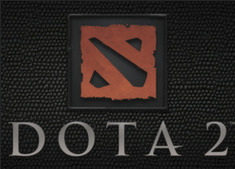
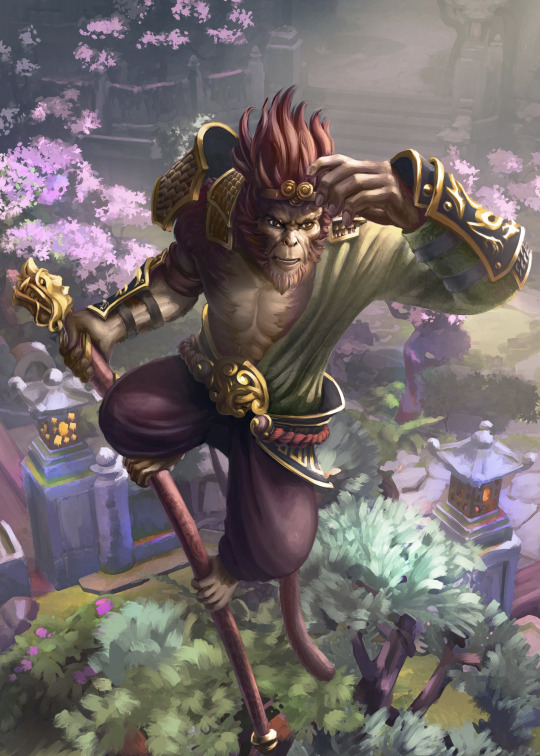
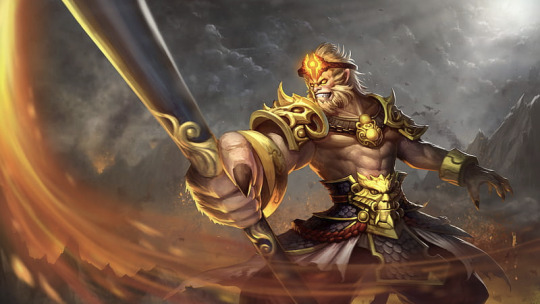
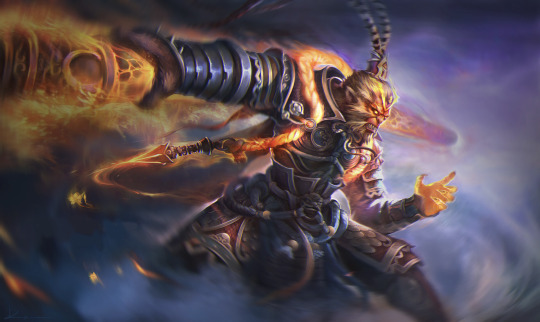
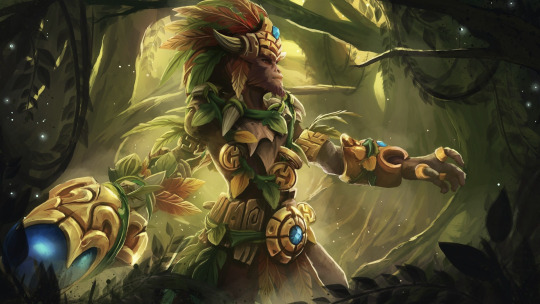
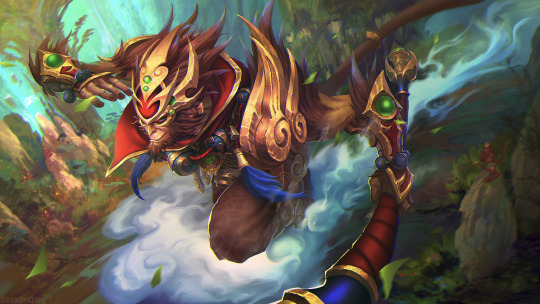

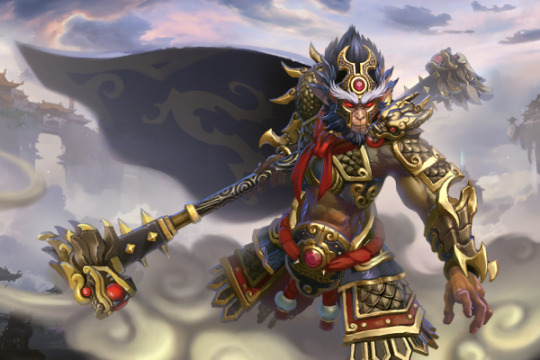

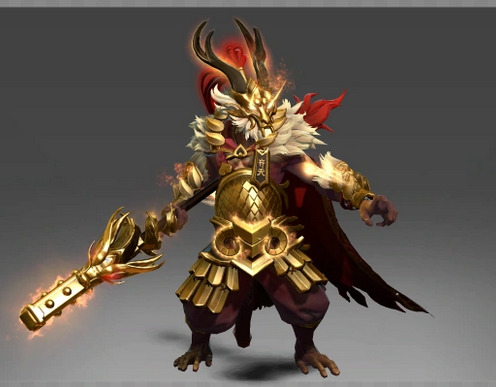
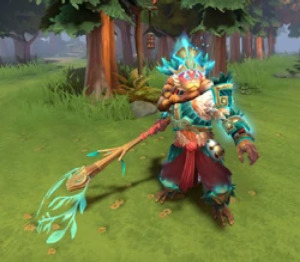
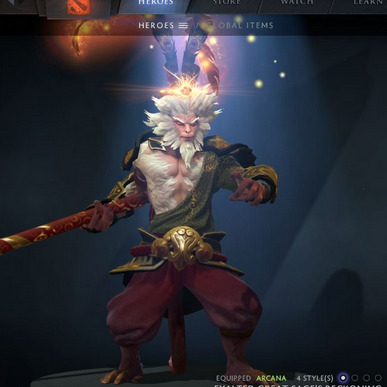

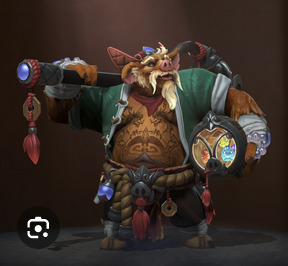

Date: July 9, 2013 Platform: Mac / PC / Linux Developer: Valve Corporation Publisher: Valve Corporation / Nexon Corporation / Perfect World Entertainment Genre: MOBA Theme: Fantasy Franchises: Dota Also known as: Defense of the Ancients 2 Type: Crossover
Summary:
Dota 2 is a free-to-play high fantasy action real-time strategy game developed and released digitally by Valve for the PC, Mac and Linux on July 9, 2013.
Built on the studio's Source engine, Dota 2 is the official sequel to Defense of the Ancients, a series of custom scenarios for the 2002 game Warcraft III: Reign of Chaos that originally popularized the "Multiplayer Online Battle Arena" sub-genre. Development of the game is led by the original mod's final lead designer, IceFrog.
Similar to the original mod, the main gameplay pits two five-player teams (the Radiant and the Dire) against each-other as they work to escort their three endless waves of AI-controlled monsters (or "creeps") to the fortified enemy base in order to destroy the enemy "Ancient". Each player controls an individual Hero character and, throughout the match, earn experience (to level up their stats and abilities) and gold (for purchasing items and equipment) by eliminating enemies.
Rather than using a weekly free-to-play character rotation system (similar to other MOBA games at the time, namely League of Legends), the game makes all characters playable from the start and features cosmetic microtransactions (such as alternate appearances for each Hero's armor and weapons, alternate announcers, and custom UI enhancements) using the Steam Inventory and Steam Market systems.
The game received numerous updates since its original release, adding new Heroes, game modes (including support for custom modes), and features while revising certain gameplay mechanics. New features include better support for both new players (with integrated community-made guide support, coaching, and improved training modes) and competitive players (with improved replay and spectator support), as well as VR headset support (for spectating and viewing cosmetics). It also received a reworked client update in June 2015 (named "Dota 2 Reborn" for a short time), porting the game to Valve's Source 2 engine (the first game released with it), and received a complete map revamp on April 2023.
Dota 2 originally received an invite-only beta in November 2011, during Gamescom 2011. It was formally launched July 9, 2013, but access was gated via a queue system until December 16, 2013. It was also distributed as a standalone game in some regions, with Perfect World publishing the game in China, and Nexon publishing the game in both Japan and South Korea. The game also received spin-offs, including the 2018 digital card game Artifact, the 2020 "auto-battler" game Dota Underlords, and the 2021 animated series Dota: Dragon's Blood.
Source: https://www.giantbomb.com/dota-2/3030-32887/
Link: https://www.youtube.com/watch?v=LqtkfCLjJz4&ab_channel=DotaCinema
#Dota 2#Defense of the Ancients 2#jttw media#game#video game#crossover#sun wukong cameo#sun wukong#six eared macaque#liuer mihou cameo#six eared macaque camero#zhu bajie
22 notes
·
View notes
Text
Top 10 most expensive African cities to live in 2024 | Business Insider Africa
Douala, Cameroon's main city and commercial hub, is a thriving metropolis recognized for its port, industry, and dynamic commerce. As the commercial hub, Douala sees a large influx of individuals looking for better economic prospects. As a result, the city boasts a high cost of living. It ranks 63rd on Mercer's index.
METHODOLOGY
Mercer's 2024 rating methodology included 226 cities from five continents. It compared the expenses of more than 200 products in each area, including accommodation, transportation, food, clothes, home goods, and entertainment. To guarantee consistency in city-ranking comparisons, New York City was used as a baseline, and currency fluctuations were assessed against the US dollar.
The numbers included in Mercer's cost comparisons are from a study done in March 2024 that included over 400 cities. Calculations and baselines were based on exchange rates at the time as well as data from Mercer's worldwide basket of goods and services (used in its Cost of Living Survey).
Black Russians (French: Russes noirs) is an unofficial name given to a group of pro–government militias in the Central African Republic, recruited mostly from former Anti-Balaka and UPC fighters by Wagner Group. The militias have been accused of multiple war crimes and crimes against humanity.[1]
S & M GOALS TEAMPLATE
Stretch Goals: Central African Republic Ranks Top 8 in FIFA World Rankings for Men's and Top 5 for Futsal
Micro Goals: All Time Laureus World Sports Awards Winner for Africans, Laureus Team Award, All Time African Footballer of the Year, AFCON Host Nation Champion*, African Transfer Record*, Insead and WSJ Conferences*, Jeune Afrique Cover*, Verified LinkedIn Member*, and Agriculture Startup Reality TV
CAPÔI HABITANT CURRENCY MODEL
Pigou Effect, Corporate Tax Havens, Capital Gains Tax Havens, Private-Public Sectors, Joint Venture Plantations, Market Extension Mergers, with Business Incubators, and Enterprise Foundation, Holding Company, Subsidiaries, and Horizontal Integration for Monopoly.
A currency union (also known as monetary union) is an intergovernmental agreement that involves two or more states sharing the same currency. These states may not necessarily have any further integration (such as an economic and monetary union, which would have, in addition, a customs union and a single market). [Pigou Effect Currency (Short FX), Currency Board Currency (Retirement Fixed Exchange Rate), Market Currency (FX Long Currency)]
Gross national product (GNP) GNP is related to another important economic measure called gross domestic product (GDP), which takes into account all output produced within a country's borders regardless of who owns the means of production. GNP starts with GDP, adds residents' investment income from overseas investments, and subtracts foreign residents' investment income earned within a country. Whilst GDP measures the total value of goods and services produced within a country's borders, GNP focuses on the income generated by its residents, regardless of their location.
Gross National Income (GNI) is the total amount of money earned by a nation's people and businesses. It is used to measure and track a nation's wealth from year to year. The number includes the nation's gross domestic product (GDP) plus the income it receives from overseas sources.
Agriculture Central Hedge Fund, Mining Unions: Peninsula Agronomique Engineering, Commodities Options Exchange (Credit Spread Options, Farm REITs, Crop Production; Fertelizers and Seeds; Equipment; Distribution and Processing Stocks, Ag ETFs and ETNs, Ag Mutual Funds), Tableau Économiques, Investments Farms REITs, Art Financing Mardi Gras
Index Franc: Tobacco-Tobacco Soil Index/Franc Tabac Currency Pair (TBS/TAF)
The overlapping generations (OLG) model; consumption-based capital asset pricing model (CCAPM); Endogenous growth theory; Material balance planning; Leontief paradox; Malinvestment; Helicopter money; Modern monetary theory
Mercantilism Spectrum of CDF/CFA
CDF Raw Materials and CFA Products. (Prices); CDF Holding Company and CFA Conglomerate Company. (Equity and Dividend Yield); CDF is Gold Standard and CFA is Helicopter Money. (FX Rate/Hedging); CDF Helicopter Money [Supplier Currency] and CFA as Purchasing Power [Consumer Currency] (Currency Union & Currency Board and Negative Interest Rates); CDF is Congolese Franc and CFA is Central African Franc
RUSSE NOIR (À MA SAUCE) FOOTBALL
À ma sauce Literally: To my sauce, True meaning: Suit my style
VEDETTE: 3-4-1-2 has 4 Pivot Formations so 5 Total: Transition to a 4-4-2 Diamond, Transition to a 4-4-2, Transition to a 4-2-3-1, Transition to a 3-3-1-3
Positional Game is Diamonds Tic-Tac-Toe with Enforcer and Avoider. Striker [Enforcer](Inverted Winger and Centre Forward), Deep Lying Playmaker [Avoider] (Holding Midfielder and Inverted Winger), and Sweeper Wingback Deep Lying Playmaker [Avoider] (Centre Back). Use Playing Styles, Manipulated Positions, and Combinational Games for Positional Play as Johan Cruyff students.
Cameroon 4-4-2 Diamond Variant: 1-3-4-2 (1) À ma sauce (Sweeper Deep-lying Playmaker Wingback) (4) Diamant (À ma sauce: Counterpressing Pivot Pressing Triggers, Sweeper-Winger Pivots, Overlapping Runs, W; I; M; V; Box Keeping Formation with 3 Centre-Backs) [Key Stats: Front Foot, Pressing Triggers, Clearance, Aerial Duel, Interceptions, Blocked Shots, Tackles, Final Ball, Key Dribbles, Overlapping Runs, Set Piece Taker] Spacing, Possession, Pass Completion, and Counter Pressing with Pursuit and Ambush Predation One Team Box Touches and Capture the Flag with Analytics-Geometry Total Football Trixie Bet on CNS Drugs (Xanax and Modafinil); 1-1-2-1 Diamond Rover Futsal Pivot Formation
Define a run in one of two ways: (i) as a set of consecutive goals scored by one team, without the other team scoring a goal; (ii) as a set of consecutive scoring events by one team, each event being either a goal or one or more Set Piece. Play aggressive and with counter pressing and run it up on the score board in the first half and after halftime play defense. You get a break at half and it's easier to win when someone plays defense and looks for opportunities instead of Attacking.
Posterior Chain Super Compensation and Speed-Endurance (Elastic-Connective Tissue) Force-Velocity Curve; Crescent Moon Horizontal Plane Vertical Force Sprinting Mechanics.
Set Piece Stylistic Biomechanics: Shooting Knee at Wall for Curve and Placement Knee for Corner. Follow through with Shot with proper Body Alignment
Knee to Feet or Shoulder to Feet Cradling for Touch/Entertainment
UEFA Front Office Curriculum
Museum d'histoire: Broken down into three major section — “A Lineage of Coaches Players and Places,” “Proving Grounds” and “Cultures of Basketball” — City/Game documents how basketball first found its origins in the neighborhoods of NYC and then went on to produce a roster of local legends who played everywhere from Rucker Park and the Cage on West 4th Street to Christ the King High School and St. John’s University.
Agility Ladder Eyes Pocket: Eyes Between Defenders Feet and Ball, Numbered Footwork V-Step (Shifting Defenders with Momentum) et L-Step (Explosive First Step), All moves should form a Triangle or an Incomplete Triangle (Coup de Pied)
*Push-Pull Sprint/Shooting Cycle: Pull Glutes et Hamstring; Push Calf et Quads for Sprints.
Sprint Size Up: A series of feint Karaoké dribble moves with Eye Tricks (Fake Pass) but Sprint Position Finish
Triangle Philosophy: All Dribbling Moves should form a Triangle or an Incomplete Triangle while using V-Step (Shifting Defenders with Momentum) et L-Step (Explosive First Step).
Thé Crescent: In Close Dribbling; Crescent Footwork with L Shapes (Paul Pogba)
On the Run Dribbling Moves: Letters and Shapes; Still Play 1 on 1: Numbered Footwork
Piedi Felici Courts: Drills Side/Box Play with 1 Net; Design Vaporwave Action Painting Angels; Knee for Direction and Sole Drags for Dribbling Touch and Crescent Moon Sprint Mechanics
Gambling Games: 5 Roll (Captain, Ship, Crew); Live-Pool Betting Monopoly
Stylistic Biomechanics: Dribbling Foot To Ball Contact (Balls of Feet and Arch of Feet); Knee for Direction; Foot Drags; & Hip Angle, Crescent Moon Running Mechanics, and Laces Kick.
Diamond Football (15 mins)
Set Up
-Lay out two overlapping sets of 4 flat markers in the positions shown above.
-Ask the players to stand on a flat marker for their teams colour (Red on Red, Yellow on Yellow).
Instruction
-Whenever the ball goes out for a kick in or for the defenders ball, the players must stand on their markers before play begins.
-As soon as the ball has been played in, players are free to move.
-Reset everytime the ball goes out.
Coaching Points, Progressions Ect.
-Ask players to shout out what each position on the park is to devlop understanding of their roles.
-If you decide to go to a normal game , leave the markers out for a visual aid for the players.
-If more than 8 players, Add in Goalkeepers who would then play the ball out to the DF,LM,RM.
-Rotate Positions, Ask Players to stand on a marker they haven't been on before
RUSSE NOIR ACCENT
Lingua Franca of Renaissance Latin (Vocabulary) and Atlantic–Congo Fon (Grammar).
Volta–Congo is a major branch of the Atlantic–Congo family. Fon (fɔ̀ngbè, pronounced [fɔ̃̀ɡ͡bē][2]) also known as Dahomean is the language of the Fon people. It belongs to the Gbe group within the larger Atlantic–Congo family.
In linguistic typology, subject–verb–object (SVO) is a sentence structure where the subject comes first, the verb second, and the object third.
Haitian Creole (/ˈheɪʃən ˈkriːoʊl/; Haitian Creole: kreyòl ayisyen, [kɣejɔl ajisjɛ̃];[6][7] French: créole haïtien, [kʁe.ɔl a.i.sjɛ̃]), or simply Creole (Haitian Creole: kreyòl), is a French-based creole language spoken by 10 to 12 million people worldwide, and is one of the two official languages of Haiti (the other being French), where it is the native language of the vast majority of the population. The language emerged from contact between French settlers and enslaved Africans during the Atlantic slave trade in the French colony of Saint-Domingue (now Haiti) in the 17th and 18th centuries. Although its vocabulary largely derives from 18th-century French, its grammar is that of a West African Volta-Congo language branch, particularly the Fongbe and Igbo languages.
Prose Accent Congo and Modern Accent Congo.
Full Lips Endings with Vertical Narrow Mouth and Soft Rs.
A noun phrase – or NP or nominal (phrase) – is a phrase that usually has a noun or pronoun as its head, and has the same grammatical functions as a noun.
BELMÔNT'S SIN INDEX FUND PORTFOLIO
Sin stock sectors usually include alcohol, tobacco, gambling, sex-related industries (Cabaret and Burlesque), and weapons manufacturers.
Diageo
Phillip Morris
Sports Betting Investment Trust
Pharmaceuticals
Business Clusters with Scrum Management and Accelerators to produce Festivals.
Example: Create a Index Fund Portfolio of 15-20 Stocks and using Supply Side Economics to create Decentralized Gambling Economy.
BELMÔNT'S DECENTRALIZED GAMBLING ECONOMY
Corporate-Capital Gains Tax Haven
High Stakes Minimum Buy In
Card Gambling (Signal and President): Top 2 highest bids fight for the Coup d'état and the other two are lesser men, the lesser men are subordinates that aid in playing cards for the warlord, the winning team splits the money, the warlords switches based on the 13 cards dealt and bets placed, the first team to shed all of their cards win.
Domestic Gambling: Boxing
Retirement Gambling: Boat Racing
Residency Program for Tax Benefits
BELMÔNT'S TURF ACCOUNTING MODEL
+EV
Python Programming Gaussian Distribution
Exotic Options Trading Live Betting
Parlays Minimum for Round Robins
Daily Fantasy Sports Rakes
RUSSE NOIR PALACE
Definitions of ballroom. noun. large room used mainly for dancing. synonyms: dance hall, dance palace**. types: disco, discotheque.
Go Go Music Influenced, Eurphoric Trance Chord Progression Melody, Progressive House and Drum n' Bass Percussion-808 Call and Response Staccato Polyrhythm or Layered Kick and Punch 808.
In his 1972 study of French lute music, scholar Wallace Rave compiled a list of features he believed to be characteristic of style brisé. Rave's list included the following: the avoidance of textural pattern and regularity in part writing; arpeggiated chord textures with irregular distribution of individual notes of the chord; ambiguous melodic lines; rhythmic displacement of notes within a melodic line; octave changes within melodic line; irregular phrase lengths.
Have the Snare and Kick say, "Hi, How are you?" And the 808 say, "I am good thanks for asking.”
Use progressive House to push the Drums Conversation to either Fast and Punchy for Happy or Slow and Deep for Sad.
In technical terms, "go-go's essential beat is characterized by a five through four syncopated rhythm that is underscored prominently by the bass drum and snare drum, and the hi-hat... [and] is ornamented by the other percussion instruments, especially by the conga drums, rototoms, and hand-held cowbells."[5]
Polyrhythm: In music, a cross-beat or cross-rhythm is a specific form of polyrhythm. The term cross rhythm was introduced in 1934 by the musicologist Arthur Morris Jones (1889–1980). It refers to a situation where the rhythmic conflict found in polyrhythms is the basis of an entire musical piece.[1]
Four-on-the-floor (or four-to-the-floor) is a rhythm used primarily in dance genres such as disco and electronic dance music. It is a steady, uniformly accented beat in 4. 4 time in which the bass drum is hit on every beat (1, 2, 3, 4).[1] This was popularized in the disco music of the 1970s[2] and the term four-on-the-floor was widely used in that era, since the beat was played with the pedal-operated, drum-kit bass drum.[3][4] (Punch 808-Kick)
Polyrhythm 4 on the Floor examples 2:4 or 5:4
Hard trance is often characterized by strong, hard (or even downpitch) kicks, fully resonant basses and an increased amount of reverberation applied to the main beat. Melodies vary from 140 to 180 BPMs and it can feature plain instrumental sound in early compositions, with the latter ones tending to implement side-chaining techniques of progressive on digital synthesizers.
Singles Only Email Raves Blogger then Multi Market Distribution Deal: A distribution deal is a contract to release the music to platforms, but not own the publishing or exclusively lock the artist in. Record Artist Producer Label: Have Polyrhythm Artist earn Streaming Percentage under a Recording Artist Deal. Label has Distribution Above Me and I have Manufacturing over Polyrhythm Artist. Have a end of the Year Album for New Year's Raves!
BELMÔNT'S SYSTEM: CAPÔI RETAINER AGREEMENT WITH ASSET PROTECTION TRUST
Capo: Describes a ranking made member of a family who leads a crew of soldiers. A capo is similar to a military captain who commands soldiers. Soldier: Also known as a “made man,” soldiers are the lowest members of the crime family but still command respect in the organization.
A capo is a "made member" of an Italian crime family who heads a regime or "crew" of soldiers and has major status and influence in the organization.
Consigliere: Defense and Corporate Lawyers
Head Boss: Ministry of Medicine
Underboss: Pharmaceutical Industry
Capo: CAPÔI RETAINER AGREEMENT
Soliders: Artisans
Commercialism is the application of both manufacturing and consumption towards personal usage, or the practices, methods, aims, and distribution of products in a free market geared toward generating a profit.
Commercial art is art created for advertising or marketing purposes. Commercial artists are hired by clients to create images and logos that sell products. Unlike works of fine art that convey an artist's personal expression, commercial art must address the client's goals.
The word 'Commercial' is defined as follows: Concerned with or engaged in commerce. Commerce is the exchange of goods or services among two or more parties.
Craftsmen are committed to the medium, not to self-expression. Artists are committed to their self-expression, not the medium.
A medium of exchange is an intermediary instrument and system used to facilitate the purchase and sale of goods and services between parties.
Stretch and Micro Goals
Music Medium System: Distribution and Retailers Contract Theory (System) for Music (Instrument)
Football Medium System: Analytics and Geometry for Free Role (System) Trixies (Instrument)
Age 16-19
Bond Funds
Farmland REITS
CFDS
Real Estate Brokerage Trust Account
Age 20-30
Farmland Recession Proof Stocks (Cosmetics, AgTech, Ag ETFS, AgETN)
Incubator and Startup Accelerators
Real Estate Joint Ventures
Age 30-40
Farmland Blue Chip Indexes w/ Credit Spread Options
CURRENCY, OIL, & GOLD COMMODITIES CANDLESTICK CHARTS
Swing Trading: Use mt4/mt5 With Heiken Ashi Charts, Setting at 14 or 21 Momentum Indicator above 0 as Divergence Oscillator and Volume Spread Analysis as Reversal Oscillator and Trade when bullish candlesticks above 200 exponential moving average and/or 20 exponential moving average (EMA) on H1 (Hourly) Time Frame; use H4 (4 Hours) and D1 (1 Day) as reference.
TUNNEL STRATEGY (OFFSHORE BANKING)
Purpose: Permanent Residency Card
$250k Deposit
$125k: 60/40 portfolio, 60% Fixed Income & REITs and 40% Blue Chip Stocks
$50k: Guaranteed Investment Certificates (GICs) and term deposits are secured investments. This means that you get back the amount you invest at the end of your term. The key difference between a GIC and a term deposit is the length of the term. Term deposits generally have shorter terms than GICs.
$75k: Spending Cash
SIN STOCKS PORTFOLIO
Sin stock sectors usually include alcohol, tobacco, gambling, sex-related industries, and weapons manufacturers.
Sports Betting Investment Trust
Pharmaceuticals
Example: Create a Index Fund Portfolio of 15-20 Stocks and using Supply Side Economics to create Decentralized Gambling Economy.
FESTIVALS DEAL
Singles Only Email Raves Blogger then Multi Market Distribution Deal: A distribution deal is a contract to release the music to platforms, but not own the publishing or exclusively lock the artist in. Record Artist Producer Label: Have Polyrhythm Artist earn Streaming Percentage under a Recording Artist Deal. Label has Distribution Above Me and I have Manufacturing over Polyrhythm Artist. Have a end of the Year Album for New Year's Raves!
NEUROPLASTICITY DRUG-CRIME NEXUS BASED ON TRAFFICKING
CPP, CNS Depressants, et FENTALOGS: Cul-de-sac
Defensive Penalty Capture The Flag Raiding Warfare
Grey-Decentralized Markets
Bastilles: Cul-de-sac Artist Résidences Penthouse Complexes
Polyrhythm Raves
Acid House Art Gallery
International Film Festival
Hôtel Chefs
Seigneurial System/Tableau Economique Raw Material Économics Production Spot
Surautomatism
Discount Networking Acid House Party
Opium Dens and Fragrance Festivals
Pill Pressers
CNS depressants
Upper-tier County System
Defense Lawyers are Traplords (Trafficking P4P and Malicious Prosecution)
Cash Conversion Cycle (CCC)
Brain Receptor Dealing
Neuroplasticity Drug-Crime Nexus
Religious Ecstasy
Entheogens are psychedelic drugs—and sometimes certain other psychoactive substances—used for engendering spiritual development or otherwise in sacred contexts
Live-Pool Betting Monopoly Board Game
Summary Sentencing
Urban Level: Street Culture Art Gallery (Street culture may refer to: Urban culture, the culture of towns and cities, Street market, Children's street culture, Street carnival, Block party, Street identity, Street food, Café culture, Several youth subculture or counterculture topics pertaining to outdoors of urban centers. These can include: Street art, Street photography, Street racing, Street wear, Hip-hop culture, Urban fiction, Street sports, Streetball, Flatland BMX, Freestyling), Art Pedagogy, Artist Residency, Art Schools, and Art Plugs
Art Pedagogy: Arts-based pedagogy is a teaching methodology in which an art form is integrated with another subject matter to impact student learning. 28-30. Arts-based pedagogy results in arts-based learning (ABL),11 which is when a student learns about a subject through arts processes including creating, responding or performing. Aesthetic Teaching: Seeking a Balance between Teaching Arts and Teaching through the Arts. In aesthetic education, learning must be developed especially with the inclusion of sensations and with the help of feelings. Sensations and feelings should lead to movement, representation, and expression. Aesthetic learning often entails learning to distinguish certain qualities or objects aesthetically in different ways depending on the situation and the purpose. Certain things can be experienced in negative ways in one activity and in positive ways in another.
A designer drug is a structural or functional analog of a controlled substance that has been designed to mimic the pharmacological effects of the original drug, while avoiding classification as illegal and/or detection in standard drug tests
Patchwork tattoos are a collection of tattoos collaged together to create an overall design. Each individual 'patch' of the tattoo can be a different design, symbol or element with a little space in between. Patchwork tattoos are a collection of tattoos collaged together to create an overall design. In short, the gun-toting angel was a multifaceted metaphor. “It undoubtedly also reflected the Catholic Counter-Reformation militaristic rhetoric,” wrote Donahue-Wallace, “which promoted the church as an army and heavenly beings as its soldiers.”
DECADENCE AESTHETICS THEORIES
Slogan
J'Cartier, Je cours après les vœux de champagne,
Subjective
Based on or influenced by personal feelings, tastes, or opinions
Gastronomy
Precarious Balance
Precariously: If something is happening or positioned precariously, it's in danger. A glass could be precariously balanced on the edge of a table. If something is on the verge of danger, then the word precariously fits.
Grey & Decentralized Markets
Tableau Économique
Semblance
Semblance is generally used to suggest a contrast between outward appearance and inner reality.
High Socioeconomic Status & Tattoos
Phantasmagorical
Having a fantastic or deceptive appearance
adjective. having a fantastic or deceptive appearance, as something in a dream or created by the imagination. having the appearance of an optical illusion, especially one produced by a magic lantern.
Socioeconomic Status Development Immigration Multilingual Sensory Play
Law of Polarity in Relationships
In any successful relationship that has an intimate connection and sexual attraction, there is polarity. What does this mean exactly? Polarity in relationships is the spark that occurs between two opposing energies: masculine and feminine. Gender does not affect whether you have masculine or feminine energy.
Second Reflection
Burden Aesthetics with Intentions
The Second Reflection lays hold of the Technical Procedures
Tattoos
SOCIO-PSYCHOLOGY
Keystone Theory Habits
Game Theory
Behavioral Finance
Self-actualization is the complete realization of one's potential, and the full development of one's abilities and appreciation for life. This concept is at the top of the Maslow hierarchy of needs, so not every human being reaches it.
Potential Psychology: Psychological potential is a very broad concept. It may include one's capacity to conform, change, re-invent oneself, bounce back from adversity, etc.
SOCIO-FORMAL SCIENCE
+EV Optimal Game Theory Poker
Civil, Agriculure, Solvent Levelling Effect Chemical Reaction, and Biomechanical Engineering
SOCIO-PHILOSOPHY
Ontology
IMPERIALISM, THE HIGHEST STAGE OF CAPITALISM
Imperialism, the Highest Stage of Capitalism,[1] originally published as Imperialism, the Newest Stage of Capitalism,[2][3] is a book written by Vladimir Lenin in 1916 and published in 1917. It describes the formation of oligopoly, by the interlacing of bank and industrial capital, in order to create a financial oligarchy, and explains the function of financial capital in generating profits from the exploitation colonialism inherent to imperialism, as the final stage of capitalism. The essay synthesises Lenin's developments of Karl Marx's theories of political economy in Das Kapital (1867).[4]
Tax Mergers Law; Market-extension merger: Two companies that sell the same products in different markets. 4.2.2 Corporate Taxation At the corporate level, the tax treatment of a merger or acquisition depends on whether the acquiring firm elects to treat the acquired firm as being absorbed into the parent with its tax attributes intact, or first being liquidated and then received in the form of its component assets.
SOCIOCULTURAL THEORY OF DEVELOPMENT
Seconds Liberal Arts are often viewed as pre-professional since, while conceived of as fundamental to citizenship, they address the whole person in recognition that our moral and spiritual identities develop best through participation in a society that perpetually renews the rights and responsibilities of membership.
Executive management master's degree programs often result in an Executive Master of Business Administration, or EMBA. They are primarily designed to act as accelerated graduate programs for working professionals who already hold management or executive positions.
Engineering college means a school, college, university, department of a university or other educational institution, reputable and in good standing in accordance with rules prescribed by the Department, and which grants baccalaureate degrees in engineering.
Monopoly Family Boarding Schools: The socio-historical context refers to the societal and historical conditions and circumstances that influence events or individuals. It involves elements like the cultural, economic, and political circumstances during a certain time period.
Agriculturism is an ideology promoting rural life, a traditional way of life. It is characterized by the valorization of traditional values (the family, the French language, the Catholic religion) and an opposition to the industrial world.
CAPÔI CLASS STRUCTURE
Demonym Examples: CAR Congolese, Gabon Congolese, Afrikaans Congolese, and Congolese
Monopoly Family (Apartheid)
Chief Executive of State (Apartheid)
Political Class (RUSSE NOIR)
Upper Class (RUSSE NOIR)
Working Class (RUSSE NOIR)
JEAN-CLAUDE TRAORÉ BUSINESS ADVICE
Blue Ocean Strategy; Solvent Levelling Effect Chemical Reaction Engineering and Economic Science.
TENNIS AGRICULTURE
A clay-court specialist is a tennis player who excels on clay courts, more than on any other surface.
Due in part to advances in racquet technology, current clay-court specialists are known for employing long, winding groundstrokes that generate heavy topspin; such strokes are less effective on faster surfaces on which the balls do not bounce as high. Clay-court specialists tend to slide more effectively on clay than other players. Many of them are also very adept at hitting the drop shot, which can be effective because rallies on clay courts often leave players pushed far beyond the baseline. Additionally, the slow, long rallies require a great degree of mental focus and physical stamina.
MATERIALISM-ILLUSION TRADWAVE CATHOLICISM THEOLOGY ECUMENISM
Salesian Order and Council of Trent Economic Materialism Culture with Distorted Sensory Overload Vice Artisan Mural Crown (Craftsmanship, Commercialism, Commerce, Medium of Exchange)
The original sense of apotheosis relates to religion and is the subject of many works of art. Figuratively "apotheosis" may be used in almost any context for "the deification, glorification, or exaltation of a principle, practice, etc.", so normally attached to an abstraction of some sort.[1] In religion, apotheosis was a feature of many religions in the ancient world, and some that are active today. It requires a belief that there is a possibility of newly-created gods, so a polytheistic belief system. The major modern religions of Christianity, Islam, and Judaism do not allow for this, though many recognise minor sacred categories such as saints (created by a process called canonization). A mural crown (Latin: corona muralis) is a crown or headpiece representing city walls, towers, or fortresses. In classical antiquity, it was an emblem of tutelary deities who watched over a city, and among the Romans a military decoration. Later the mural crown developed into a symbol of European heraldry, mostly for cities and towns, and in the 19th and 20th centuries was used in some republican heraldry.
The body of light, sometimes called the 'astral body'[a] or the 'subtle body,'[b] is a "quasi material"[1] aspect of the human body, being neither solely physical nor solely spiritual, posited by a number of philosophers, and elaborated on according to various esoteric, occult, and mystical teachings. Other terms used for this body include body of glory,[2] spirit-body, luciform body, augoeides ('radiant body'), astroeides ('starry or sidereal body'), and celestial body.[3] The concept derives from the philosophy of Plato: the word 'astral' means 'of the stars'; thus the astral plane consists of the Seven Heavens of the classical planets. The idea is rooted in common worldwide religious accounts of the afterlife[4] in which the soul's journey or "ascent" is described in such terms as "an ecstatic, mystical or out-of body experience, wherein the spiritual traveller leaves the physical body and travels in their body of light into 'higher' realms."[5]
The canon law of the Catholic Church (from Latin ius canonicum[1]) is "how the Church organizes and governs herself".[2] It is the system of laws and ecclesiastical legal principles made and enforced by the hierarchical authorities of the Catholic Church to regulate its external organization and government and to order and direct the activities of Catholics toward the mission of the Church.
An institute of consecrated life is an association of faithful in the Catholic Church canonically erected by competent church authorities to enable men or women who publicly profess the evangelical counsels by religious vows or other sacred bonds "through the charity to which these counsels lead to be joined to the Church and its mystery in a special way".[1] They are defined in the 1983 Code of Canon Law under canons 573–730. The Congregation for Institutes of Consecrated Life and Societies of Apostolic Life has ecclesial oversight of institutes of consecrated life.[2]
In Christianity, the three evangelical counsels, or counsels of perfection, are chastity (FUCK THIS), poverty (or perfect charity)*, and obedience (Reckless Abandonment)*.[1] As stated by Jesus in the canonical gospels,[2] they are counsels for those who desire to become "perfect" (τελειος, teleios).[3][4] The Catholic Church interprets this to mean that they are not binding upon all, and hence not necessary conditions to attain eternal life (heaven), but that they are "acts of supererogation", "over and above" the minimum stipulated in the biblical commandments.[5][6]
Catholics who have made a public profession to order their lives by the evangelical counsels, and confirmed this by public vows before their competent church authority (the act of religious commitment known as a profession), are recognised as members of the consecrated life.
Tradwave is a Catholic artistic style using synthwave and vaporwave art to promote traditional catholicism. Tradwave usually uses traditional catholic paintings, sculptures, or photographs of saints, given with vaporwave effects, often with a bible verse or quote about catholicism. The art usually tries to convey a resurrection of catholic spirituality in the modern atheist world. Figures often depicted in Tradwave art include Jesus Christ, the Virgin Mary, Ven. Fulton Sheen, Cardinal Robert Sarah, and Mother Angelica.
Tradwave music often takes the form of two main styles. One of them is catholic hymns with vaporwave effects and traditional Vaporwave/Lo-Fi music. It can also have quotes from modern prolific Catholic figures, such as Ven. The other theme is Fulton Sheen and Cardinal Robert Sarah.
The term political religion is based on the observation that sometimes political ideologies or political systems display features more commonly associated with religion.
Religious nationalism can be understood in a number of ways, such as nationalism as a religion itself, a position articulated by Carlton Hayes in his text Nationalism: A Religion, or as the relationship of nationalism to a particular religious belief, dogma, ideology, or affiliation. This relationship can be broken down into two aspects: the politicisation of religion and the influence of religion on politics.
Dioceses ruled by an archbishop are commonly referred to as archdioceses; most are metropolitan sees, being placed at the head of an ecclesiastical province. In the Catholic Church, some are suffragans of a metropolitan see or are directly subject to the Holy See.
Heavenly Virtue: Another phrase to describe this obedience to the voice is “reckless abandon.” It simply means that we let God do what God wants to do through us. It means if He tells us to do something or say something—we do it.
The Dionysian Mysteries were a ritual of ancient Greece and Rome which sometimes used intoxicants and other trance-inducing techniques (like dance and music) to remove inhibitions and social constraints, liberating the individual to return to a natural state.
Catholic School Girls Moon Evangelical Prophets: Consecrated life is "placed in a privileged position in the line of evangelical prophecy," whereby its “charismatic nature” and communal discernment of the Spirit "makes it capable of inventiveness and originality.”
Men Mars Angelology Conversion System: Church Enterprises (Planetary Intelligence Church District Real Estate; Liberal Arts Catholic Immersion Schools; Gold; Athletics; Cooking);
Church Gatherings (School Nights Virgil, Weekend Noon Mass then Weekend Sports League) Francis de Sales and Don St. Bosco Influence
Angelology Patchwork Tattoos: Biblical Crowns, Praying Hands, Gun Toting Angels, Dirty Dancing Angels, Drug Using Angels, Heavenly Choir, Summa Theologica Sherman, Saints and Pastors, Hebrew Tetragram, Council of Trent
🇨🇲🇨🇲🇨🇲🇨🇲🇨🇲🇨🇲🇨🇲🇨🇲🇨🇲🇨🇲🇨🇲🇨🇲🇨🇲🇨🇲🇨🇲🇨🇲🇨🇲🇨🇲🇨🇲🇨🇲🇨🇲🇨🇲🇨🇲🇨🇲🇨🇲🇨🇲🇨🇲🇨🇲🇨🇲🇨🇲🇨🇲🇨🇲🇨🇲🇨🇲🇨🇲🇨🇲
RUSSE NOIR
18 notes
·
View notes
Text
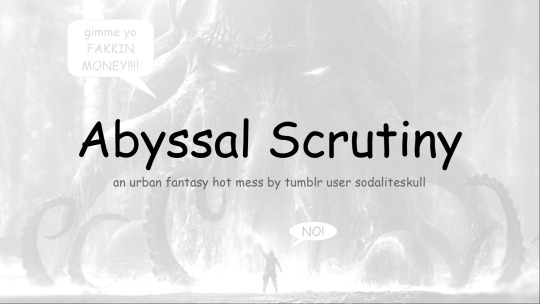
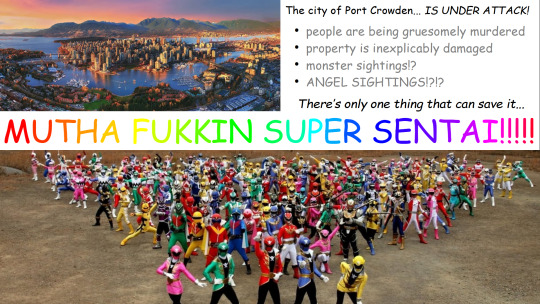
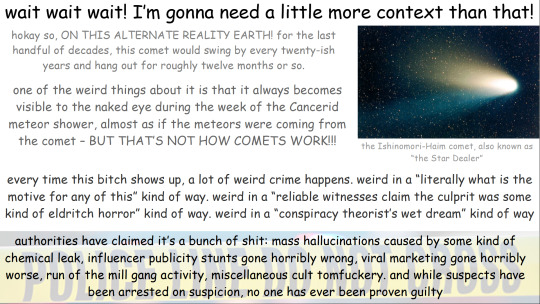
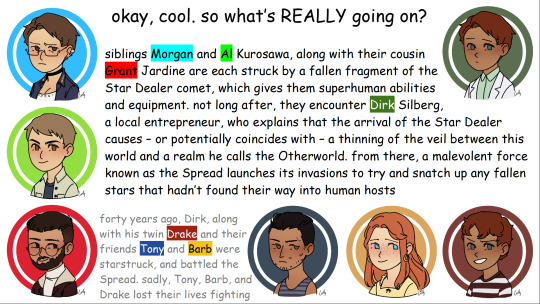
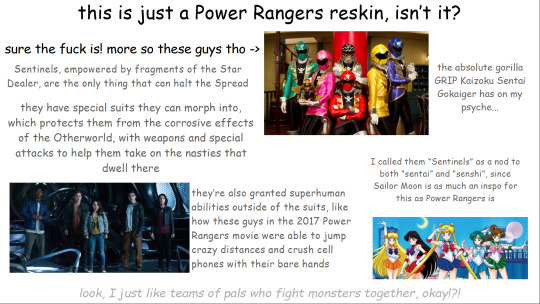
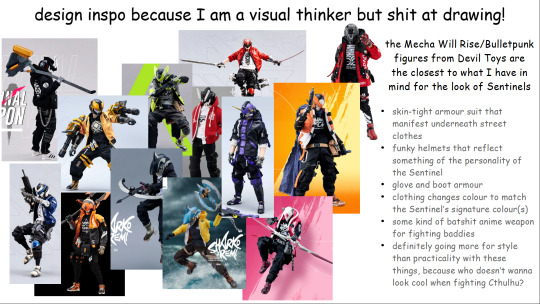
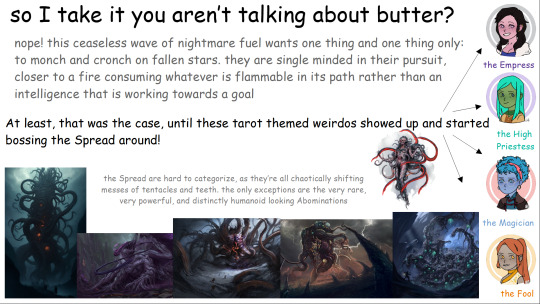
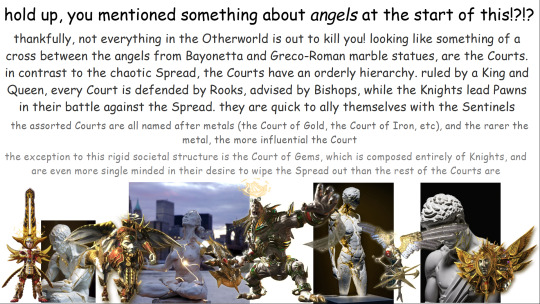
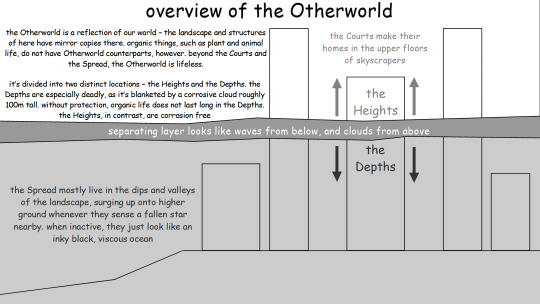
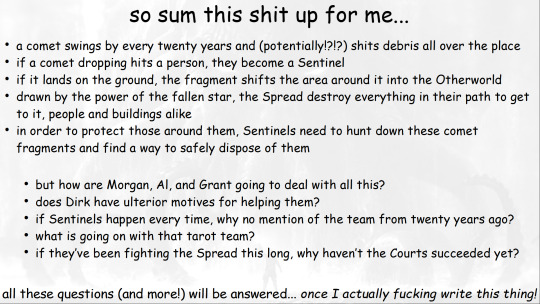
alt text under the cut:

SLIDE ONE
TEXT: Abyssal Scrutiny: an urban fantasy hot mess by tumblr user sodaliteskull
(IMAGES: the background shows a washed out image of a person standing before Cthulhu. They are minuscule in comparison. A speech bubble coming out of Cthulhu's mouth reads, "gimme yo FAKKIN MONEY!!!!"to which the person is responding, "NO!")
SLIDE TWO
TEXT: The city of Port Crowden... IS UNDER ATTACK!
people are being gruesomely murdered
property is inexplicably damaged
monster sightings!?
ANGEL SIGHTINGS!?!?
There's only one thing that can save it... MUTHA FUKKIN SUPER SENTAI!!!!!
(IMAGES: in the upper left hand corner is a picture of Vancouver, standing in for the fictional city of Port Crowden. Along the bottom is an image from the 35th anniversary of the Super Sentai media franchise, showing nearly 200 precursors to the Power Rangers)
SLIDE THREE
TEXT: wait wait wait! I'm gonna need a little more context than that!
hokay so, ON THIS ALTERNATE REALITY EARTH! for the last handful of decades, this comet would swing by every twenty-ish years and hang out for roughly twelve months of so.
one of the weird things about it is that is always becomes visible to the naked eye during the week of the Cancerid meteor shower, almost as if the meteors were coming from the comet - BUT THAT'S NOT HOW COMETS WORK!!!
every time this bitch shows up, a lot of weird crime happens. weird in a "literally what is the motive for any of this" kind of way. weird in a "reliable witnesses claim the culprit was some kind of eldritch horror" kind of way. weird in a "conspiracy theorist's wet dream" kind of way
authorities have claimed it's a bunch of shit: mass hallucinations caused by some kind of chemical leak, influencer publicity stunts gone horribly wrong, viral marketing gone horrible worse, run of the mill gang activity, miscellaneous cult tomfuckery. and while suspects have been arrested on suspicion, no one has ever been proven guilty
(IMAGE: a picture of comet Hale-Bopp, standing in for the Star Dealer comet)
the Ishinomori-Haim comet, also know as "the Star Dealer"
(IMAGE: along the bottom is a faded out photo of "POLICE LINE DO NOT CROSS" tape)
SLIDE FOUR
TEXT: okay, cool. so what's REALLY going on?
siblings Morgan and Al Kurosawa, along with their cousin Grant Jardine are each struck by a fallen fragment of the Star Dealer comet, which gives them superhuman abilities and equipment. not long after, they encounter Dirk Silberg, a local entrepreneur, who explains that the arrival of the Star Dealer causes - or potentially coincides with - a thinning of the veil between this world and a realm he calls the Otherworld. from there, a malevolent force known as the Spread launches its invasions to try and snatch up any fallen stars that hadn't found their way into human hosts.
forty years ago, Dirk, along with his twin Drake and their friends Tony and Barb were starstruck, and battled the Spread. sadly, Tony, Barb, and Drake lost their lives fighting
(IMAGES: Picrews of the characters mentioned. Morgan has short brown hair, brown eyes, tan skin, glasses, and is associated with the colour blue. Al has short sandy brown hair, brown eyes, tan skin, and is associated with the colour green. Grant has short dark brown hair and beard, dark brown eyes, olive skin, glasses, and is associated with the colour red. Dirk has short ruddy brown hair, hazel eyes, olive skin, and is associated with the colour green. Drake has short ruddy brown hair, hazel eyes, olive skin, and is associated with the colour red. Tony has short black hair and stubble, light brown eyes, olive skin, and is associated with the colour blue. Barb has long ginger hair, blue eyes, fair skin covered in freckles, and is associated with the colour yellow.)
SLIDE FIVE
TEXT: this is just a Power Rangers reskin, isn't it?
sure the fuck is! more so these guys tho -> (IMAGE: a team photo of the Gokaigers. Gokai Red is seated with his arms crossed, while Gokai Yellow is to his left, and Gokai Pink is to his right, holding the mechanical bird Navi in her arms. Gokai Silver is standing behind Gokai Red, while Gokai Blue is to the left of Gokai Yellow, and Gokai Green is to the right of Gokai Pink)
the absolute gorilla GRIP Kaizoku Sentai Gokaiger has on my psyche…
Sentinels, empowered by fragments of the Star Dealer, are the only thing that can halt the Spread
they have special suits they can morph into, which protects them from the corrosive effects of the Otherworld, with weapons and special attacks to help them take on the nasties that dwell there
they are also granted superhuman abilities outside of the suits, like how these guys in the 2017 Power Rangers movie were able to jump crazy distances and crush cell phones with their bare hands (IMAGE: a screenshot from the aforementioned movie, showing Billy, Jason, Trini, Zack, and Kimberly standing in the Command Centre)
I call them "Sentinels" as a nod to both "sentai" and "senshi", since Sailor Moon is as much an inspo for this as Power Rangers is (IMAGE: a promotional image from the 90's Sailor Moon anime, showing Sailor Venus, Sailor Mars, Sailor Moon, Sailor Mercury, and Sailor Jupiter striking their signature poses against the background of a Tokyo night skyline)
look, I just like teams of pals who fight monsters together, okay!?!
SLIDE SIX
TEXT: design inspo because I am a visual thinker but shit at drawing!
the Mecha Will Rise/Bulletpunk figures from Devil Toys are the closest to what I have in mind for the look of Sentinels
skin-tight armour suits that manifest underneath street clothes
funky helmets that reflect the personality of the Sentinel
glove and boot armour
clothing changes colour to match the Sentinel's signature colour(s)
some kind of batshit anime weapon for fighting
definitely going more for style than practicality with these things, because who doesn't wanna look cute when fighting Cthulhu?
(IMAGES: thirteen figures from Devil Toys, all of which are wearing cyberpunk/techwear fashion in an assortment of colours, all of them wearing mecha style helmets, while some of them are wielding some kind of over-the-top weapon)
SLIDE SEVEN
TEXT: so I take it you aren't talking about butter?
nope! this ceaseless wave of nightmare fuel wants one thing and one thing only: to monch and cronch on fallen stars. they are single minded in their pursuit, closer to a fire consuming whatever is flammable in its path rather than an intelligence that is working towards a goal
At least, that was the case, until these tarot themed weirdos showed up and started bossing the Spread around! (IMAGES: arrows pointing to four figures - the Empress, a woman with long black hair and pale purple skin and dark purple eyes, associated with the colour silver. the High Priestess, with long pale green hair, darker green skin, and even darker green eyes, associates with the colour purple. the Magician, with a short ocean blue afro, sky blue skin, and pale blue eyes, wearing glasses and associated with the colour red. and the Fool, with long orange hair tied in a pony tail, khaki skin, and golden eyes, associated with the colour yellow)
the Spread are hard to categorize, as they're all chaotically shifting messes of tentacles and teeth. the only exceptions are the very rare, very powerful, and distinctly humanoid looking Abominations
(IMAGES: five pictures of eldritch horrors looming in nightmarish landscapes, representing the Spread. there's a lot of tentacles and pustules and assorted other body horror going on in each image. representing an Abomination is a humanoid figure somehow both skeletal and fleshy, with a mass of tentacles coming out of its back)
SLIDE EIGHT
TEXT: hold up, you mentioned something about angles at the start of this!?!?
thankfully, not everything in the Otherworld is out to kill you! looking like something of a cross between the angles from Bayonetta and Greco-Roman marble statues, are the Courts. in contrast to the chaotic Spread, the Courts have an orderly hierarchy. ruled by a King and Queen, every Court is defended by Rooks, advised by Bishops, while the Knights lead Pawns in their battle against the Spread. they are quick to ally themselves with the Sentinels
the assorted Courts are all named after metals (the Court of Gold, the Court of Iron, etc), and the rarer the metal, the more influential the Court
the exception to this rigid societal structure is the Court of Gems, which is composed entirely of Knights, and are even more single minded in their desire to wipe the Spread out than the rest of the Courts are
(IMAGES: several different enemy angels from the Bayonetta games, all of them looking like mythological monsters made of white marble and wearing crimson and gold armour, with statuesque faces in places where they should not be. behind them are several white marble statues with veins of gold running through them, almost giving them the effect of the Japanese style of Kintsugi, wherein one uses gold to mend cracks in pottery)
SLIDE NINE
TEXT: overview of the Otherworld
the Otherworld is a reflection of our world - the landscape and structures of here have mirror copies there. organic things, such as plants and animal life, do not have Otherworld counterparts, however. beyond the Courts and the Spread, the Otherworld is lifeless.
it's divided into two distinct locations - the Heights and the Depths. the Depths are especially deadly, as it's blanketed by a corrosive cloud roughly 100m tall. without protection, organic life does not last long in the Depths. the Heights, in contrast, are corrosion free.
(IMAGE: a rough outline of five buildings on a flat plateau, to the left of which slopes down off screen)
the Heights
the Courts make their homes in the upper floors of skyscrapers
(IMAGE: the three tallest buildings are poking up into the Heights, while everything else in the city resides in the Depths)
separating layer looks like waves from below, and clouds from above
the Depths
the Spread live in the dips and valleys of the landscape, surging up onto higher ground whenever they sense a fallen star nearby. when inactive, they just look like an inky black, viscous ocean
SLIDE TEN
(IMAGE: the background is the person standing before Cthulhu image from the first slide, only washed out to the point where it's barely visible)
TEXT: so sum this shit up for me…
a comet swings by every twenty years and (potentially!?!?) shits debris all over the place
if a comet dropping hits a person, they become a Sentinel
if it lands on the ground, the fragment shifts the area around it into the Otherworld
drawn by the power of the fallen star, the Spread destroy everything in their path to get to it, people and buildings alike
in order to protect those around them, Sentinels need to hunt down these comet fragments and find a way to safely dispose of them
but how are Morgan, Al, and Grant going to deal with all this?
does Dirk have ulterior motives for helping them?
if Sentinels happen every time, why no mention of the team from twenty years ago?
what is going on with that tarot team?
if they've been fighting the Spread this long, why haven't the Courts succeeded yet?
all these questions (and more!) will be answered… once I actually fucking write this thing!
#comic sans wip intro#comic sans presentation#wip intro#story introduction#writers on tumblr#voidyelling.txt#sentinel.exe
6 notes
·
View notes
Text
Stargazing
Cassian Andor/GN!Reader
Reuniting on an under-equipped rebel base, Cassian lets a secret slip.
@moonlight-prose SURPRISE!! I was your secret santa! I’m so sorry it’s so late, and it’s shorter than I wanted it to be, but it’s HERE! I really hope you enjoy it 🥰🥰
Warnings/Content: fluffy fluff, nothing but fluff! Huddling for warmth, references to there only being one bed, friends to lovers, stargazing, sharing a blanket. Reader has a plate of food but isn’t depicted eating it. Also featuring guest appearances from K2SO and my Droid OC.
Word Count: 1k.

You’re under prepared for the weather, going at lightspeed from a volcanic planet to this floating snowball in a few hours wasn’t the best idea, but you’d had to get out of there sharpish after your cover was blown, a mad dash for the ship (and droid) you’d stashed on your arrival the only way out.
Clover grumbles in binary as she exits the droid-port, complaining about the lack of warning you’d given her to start the pre-flight checks. She stops in her tracks as the large ex-imperial droid greets her, both bemoaning their choice in human companion as you exit the ship, cursing in an instant at the sudden temperature drop.
Cassian’s there to greet you, wrapping a blanket around your shoulders with a smile, “I missed you.”
“Missed you too.” You pull the blanket closer, “Maker, it’s freezing.”
“Perks of living in an old Clone War base,” Cassian grins, “Come on, you need to get warm and then give your report.” He starts walking, expecting you to follow. “Not even gonna give me a welcoming hug?” You huff, going after him. “My hands are cold, I could slip one under your collar you know?”
“You wouldn’t dare.” He stares, eyes wide, “Don’t you dare.”
~~~
You hadn’t dared, just demanded a hug, then headed to Cassian’s bunk where he’d managed to store another big coat for you to slip on. You hadn’t even been due back for another week, so the fact he had it ready was enough to warm your cheeks, even if the coat had to warm the rest of you.
You hadn’t expected him to be here at all, neither of you having the details of each other’s missions as a precaution should either of you be captured by the Empire, or pirates, or other nefarious groups who might want to jeopardise the Rebellion’s efforts. He’s been here about three days already, arriving just before a large ship full of new recruits - who since have placed dibs on all the nice beds, but he’s promised there’s space on his bunk for you if you don’t mind being squished beside him.
It’s one of the last things you mind, knowing he’s close and safe is truly the most comforting thing you could ask for at the moment, with such a narrow escape just hours before having him at your side is the only thing that stops you falling apart.
Well, that and Clover’s chuntering through the whole journey.
Neither are with you as you give your report in the command centre, it was a need to know mission, and even though it’s over and your droid had been on the planet with you, it’s still judged to be out of their concern.
~~~
Cassian had promised to meet you in the canteen, the small amount of rations allocated to you piled on the plate across from him as he watches the door eagerly, waiting for you.
He missed you terribly, everything around reminding him of you- that trinket in the market, the wind chimes that the local population strung everywhere, the warmth of the sun on his skin… You would’ve loved that planet, and he couldn’t share it with you… probably can’t ever go back there while the Empire still has its strangulating grip on the galaxy…
You’re his best friend, and that’s enough… Even though catching sight of you coming through the canteen doors makes his heart stutter, meeting your eyes and watching as your face morphs from a frown to a smile that rivals the sun of Kenari in its brightness.
“Good meeting?” He smiles as you sit opposite him, a thick coat around you now instead of the blanket. Much better for keeping you warm.
“Mm,” you nod, “Signed off missions for a few weeks. Gotta rest and recuperate, apparently.”
“I’m sure Clover will be thrilled.” He grins.
“Stuck on this planet? I doubt it. She’s so hard to please.”
Cassian laughs, “Hanging out with Kay should improve her mood, hm? They can trade stories about their silly humans.”
“You’re sticking around too then?”
“For a little while. We can freeze together. Or bury ourselves in a pile of blankets.”
“Sounds perfect.”
~~~
The day passes quickly - and not simply because the base is near to one of the planet’s poles and sunlight is limited. The slight amount of heat it provides amongst the ice hills and frozen plains disappears with the light, plunging the ill-equipped base into temperatures that surely must come close to getting dipped in carbonite.
The only benefit to nightfall here - like most deserted planets - is the sight of the stars. And with outside not much colder than inside, Cassian takes the opportunity to sit at the base’s entrance and watch them, a hot flask of Caf cradled in his hands. You join him with your own, side by side, huddled close beneath the thickest blanket you could find.
“Yes!” He rasps, grinning widely, “I wanted you to see this.”
You frown, sparing a glance at him to see him watching the sky. You follow his gaze, squinting as you try to focus on everything but the feel of his thigh pressed up against yours, sharing his body heat… it’s the closest you can get- as best friends… even if you want to scooch closer and end up with your back against his chest.
“Oh!” You gasp, finally spotting it- green and red ripples across the sky, purple in places where the colours bleed together, an aurora bursting to life above you. “Oh, Cassian… It’s beautiful.”
He smiles, staring at the side of your face, “Yeah, it is.”
You scoff, nudging him with your elbow, “Says the guy who saw the Eye on Aldhani.”
He frowns, “Shh. I wasn’t supposed to tell you that.”
“You tell me everything.” You counter, “Most things.”
“Most things.” He nods. Not everything. He looks up at the sky again, then back to you… “You wanna know something else?”
“Hm?” You smile.
“I think I’m in love with you.”
You turn your head so fast you almost give yourself whiplash, staring in surprise, “What?”
“You heard me.” He whispers, suddenly flustered, “I understand if you don’t want to pursue-“
“Kiss me?” You interrupt, “Cassian. Kassa. I know I’m in love with you. Kiss me.”
And so he does.
~~~
Taglist: @the-little-ewok @yours-truly-r @princessxkenobi @wildmoonflower @practicalghost @concussed-dragon @aurelacrystal @salome-c @miraclesabound @amneris21 @withakindheartx @harriedandharassed @alexxavicry @honestly-shite
110 notes
·
View notes
Text
Logistics Solutions Company in India: Excellence Delivered by Everfast Freight
India's rapidly evolving economy thrives on a robust logistics sector. A well-structured logistics system ensures seamless transportation, optimized supply chains, and timely deliveries. Among the key players transforming this industry, Everfast Freight emerges as a premier Logistics Solutions Company in India, offering unparalleled services tailored to meet diverse business needs.
Why Choose a Reliable Logistics Partner? Businesses today demand efficiency, accuracy, and reliability in logistics operations. A dependable logistics partner can:
Streamline supply chain operations. Minimize costs and enhance productivity. Ensure timely delivery, which boosts customer satisfaction. Adapt to industry-specific challenges and provide customized solutions. Everfast Freight stands as a trusted name in this domain, excelling in providing comprehensive logistics solutions across India and beyond.
Services Offered by Everfast Freight
Transportation Services Efficient transportation forms the backbone of logistics. Everfast Freight ensures safe and timely delivery of goods, whether it’s domestic or international transport. Their fleet management system and network enable smooth operations across urban and remote areas alike.
Warehousing Solutions With strategically located warehouses across India, Everfast Freight provides secure storage facilities equipped with modern technology. This service is essential for inventory management, ensuring businesses can scale operations without logistical constraints.
Freight Forwarding Be it air, sea, or road freight, Everfast Freight’s expertise in forwarding ensures cost-effective and timely delivery. Their global connections and strategic partnerships make international shipping hassle-free.
Custom Clearance Navigating the complexities of import and export regulations is easier with Everfast Freight’s customs clearance solutions. Their experienced team ensures compliance with Indian and international laws, minimizing delays.
Supply Chain Management Optimizing the end-to-end supply chain process is Everfast Freight’s forte. From sourcing to delivery, their innovative solutions enhance operational efficiency and reduce overheads.
What Sets Everfast Freight Apart? Cutting-Edge Technology The company leverages the latest tools to track shipments, manage inventory, and ensure real-time communication with clients.
Customer-Centric Approach Every client receives personalized attention. Everfast Freight’s solutions are tailored to match specific industry demands, whether in e-commerce, manufacturing, or retail.
Pan-India Presence With an extensive network across major cities and ports, Everfast Freight ensures comprehensive logistics coverage throughout India.
Sustainability Practices Acknowledging the environmental impact of logistics, Everfast Freight integrates sustainable practices like fuel-efficient vehicles and eco-friendly packaging.
Industries Served Everfast Freight’s logistics expertise spans a variety of industries, including:
E-commerce: Quick delivery solutions for the fast-paced online retail sector. Pharmaceuticals: Temperature-controlled storage and transport for sensitive products. Automotive: Seamless supply chain integration for vehicle parts and components. FMCG: Efficient handling of perishable and fast-moving consumer goods. Why Everfast Freight is Your Ideal Logistics Partner In a competitive market, businesses need a logistics partner that ensures reliability, scalability, and innovation. Everfast Freight excels in providing end-to-end logistics solutions that adapt to market demands and technological advancements.
Whether you're a startup looking to expand or an established company seeking to optimize your supply chain, Everfast Freight offers services that drive success.
Conclusion As a leading Logistics Solutions Company in India, Everfast Freight continues to redefine the benchmarks of logistics excellence. Their commitment to quality, innovation, and customer satisfaction makes them the go-to partner for businesses aiming to streamline operations and ensure timely delivery.
2 notes
·
View notes
Text
Another Million Dollar Idea
So lately I've been doing lots of listed and unlisted streams from the Playstation 5. Mostly unlisted. Previously, when I wanted to stream something to my friends, I'd have to open the Elgato on my desktop and pipe that in through Discord, which works but isn't ideal.

For one, my PC is rapidly showing its age, so I have to dump the Elgato down to 720p30 because Discord chugs when capturing this window. Mostly it's good at auto-cropping to only the gameplay, but sometimes it gets confused and will capture the entire window, where you see the settings and buttons. So it kinda sucks.
The easier way to do that is to start up an unlisted YouTube live stream to my dump channel and link it to my friends on Discord. Whatever resolution I want, 60fps, no muss, no fuss. Quick and painless. Here's a stream from the other day where I showed a friend the new version of Asphalt 9 for PS5. It's just raw gameplay footage, no mic:
And, when I want to do a bigger stream, with all my alerts, pop-ups, sounds and rewards, I can always warm up OBS and stream to Twitch properly.
Recently, I house sat for a cousin for eight days. I treat this like a vacation. I can't really work on videos or games or podcasts very much, so I just kick back and chill out. And since these consoles can stream, I can do very long (like 6+ hour) streams easy-peasy.
But let's be real: streaming to Twitch through the PS5 (and the PS4) sucks. I'd have to go in and turn off all my alerts and buttons and overlays, because none of that works on the console stream. The whole thing feels extremely limited, and it's even worse on PS5, where it will automatically end your broadcast if you try to switch games.
But this time around I tried to get something going where I could still get all of my fancy notifications and graphics and still stream from the PS5. The hope was to use remote play on my laptop with the PS5 in the same room, but remote play is too thirsty on the bandwidth for that. Or my 13 year old laptop just can't hang running both OBS and Remote Play at the same time.
youtube
But it made me wonder: why should it have to be like this? Game consoles now are more like computers than ever before. There's nothing stopping these systems from supporting real streaming features, like overlays and pop-ups.
And it feels like a deeply untapped market, when you think about it. Imagine if, say, Microsoft came out swinging that the Xbox Series X was the one stop box for professional streamers. Full support for customizable Twitch alerts and overlays, a way to set up soundboards, browser sources, trigger ad breaks, run polls, etc. etc. etc.
Like, think about Elgato. Elgato sells streaming hardware for the PC. Capture cards, lights, cameras, shortcut decks, teleprompters, the works. Streaming and video production is a huge business for them.
If Microsoft or Sony cut in on that market a little bit and rebranded their console as The Only Streaming Hardware You'll Ever Need? Imagine branded streams and the loyalty that could generate.
And these systems have USB ports, obviously. They support common headset protocols through the headphone jack. You can plug professional equipment into them already. Why not have built-in hardware support for that?
The answer is that Microsoft and Sony probably only support Twitch begrudgingly, because some bean counter is annoyed they're "giving money away." After all, Microsoft owned and shut down Mixer. For a time they'd much rather you stay off of Twitch. When you see ads and buy subs they want some of that cut going their way, not to Amazon.
Which is ultimately very short sighted. Microsoft in particular has been rolling over and giving up a lot of ground the last three to five years. If they rebranded as the Xbox being the console for streamers to start and maintain a career over the long term, they could lock in a market that only exists on the PC right now.
If anyone at Microsoft or Playstation is reading this and uses this as inspiration I will take a one time payment of $250,000 for being the world's best ideas guy.
4 notes
·
View notes